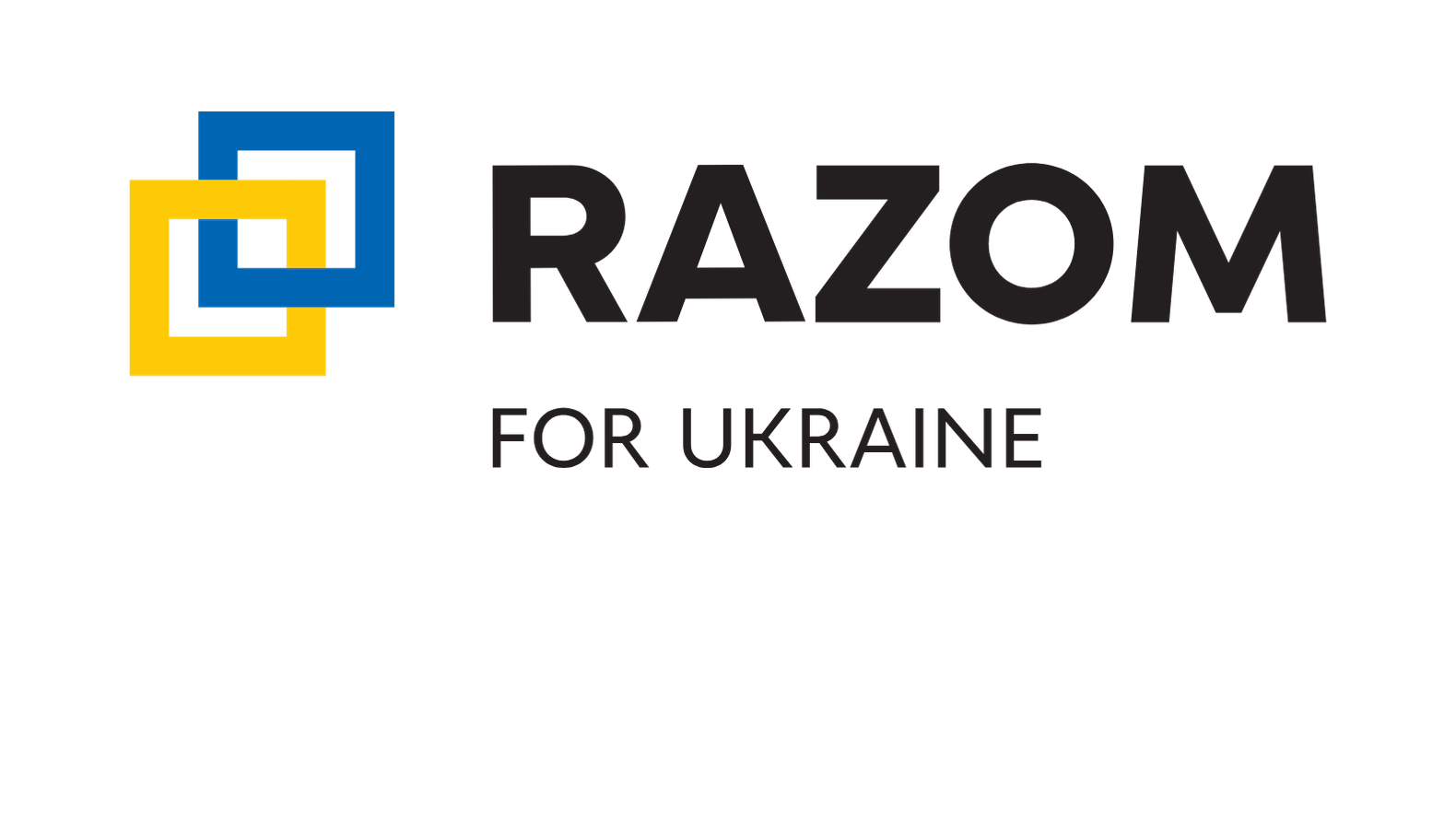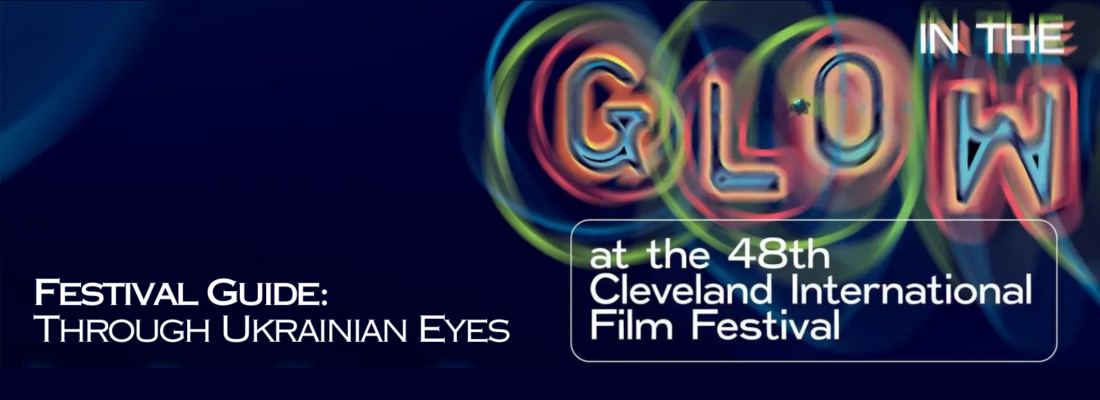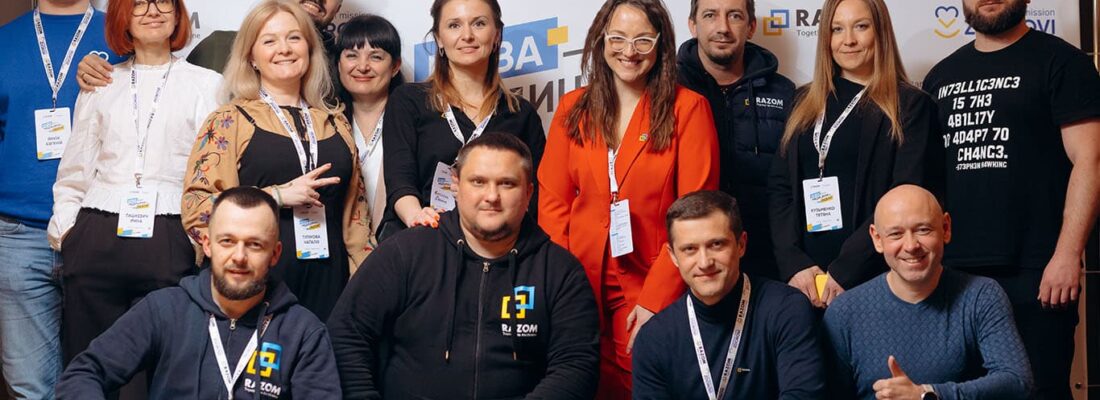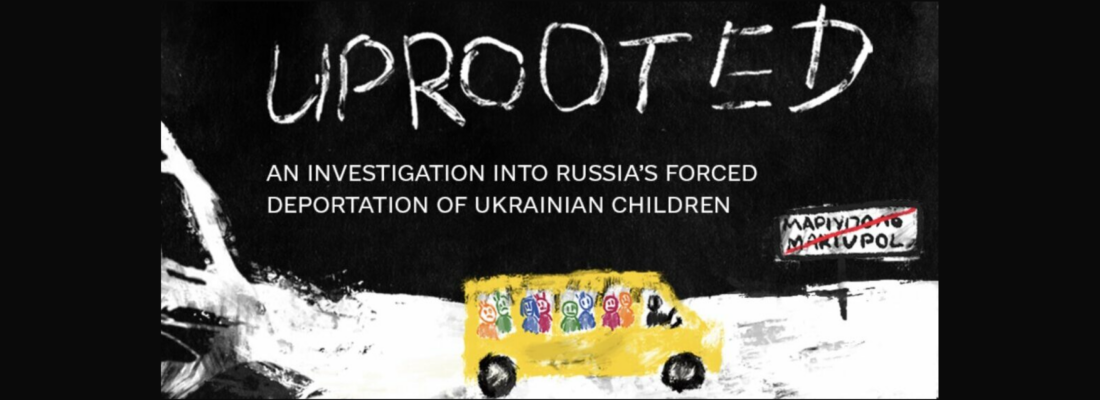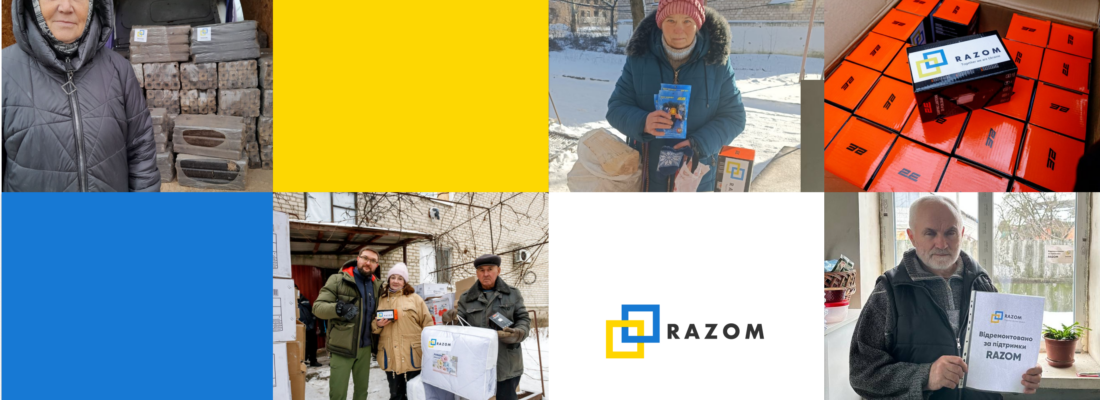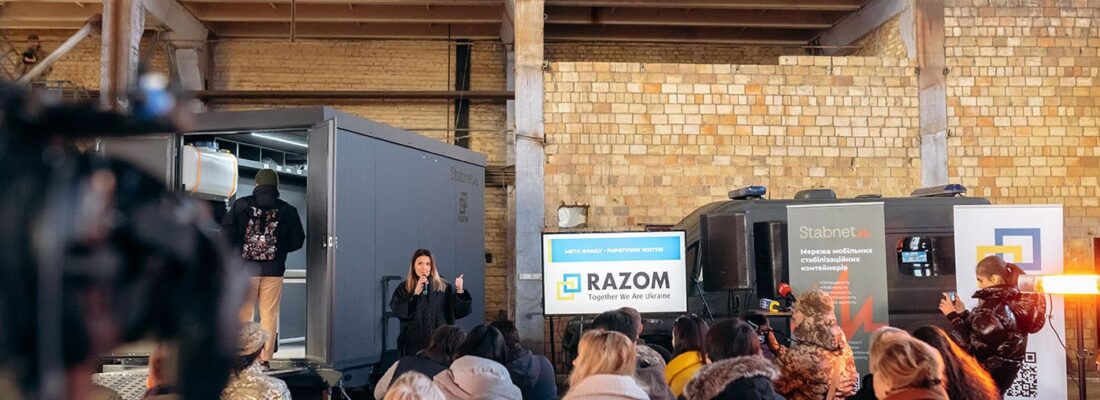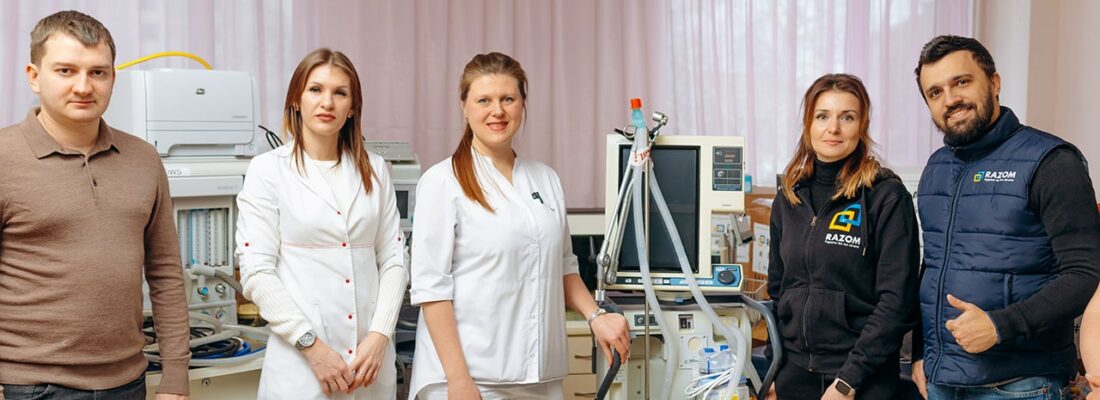Razom for Ukraine statement on Speaker Johnson’s plan to advance Ukraine aid
Razom for Ukraine Calls on House Democrats to Sign Discharge Petition.
Cleveland International Film Festival Guide: Through Ukrainian Eyes
Film festival season is well underway, and Razom Cinema is keeping a close eye on what’s being programmed. The Sundance Film Festival brought another win for a Ukrainian story – the documentary Porcelain War directed by Slava Leontyev and Brendan Bellomo took home the Grand Jury Prize for Documentary Feature. The film is coming to the Cleveland International Film Festival (CIFF) and will be screening together with other stories focused on the ongoing war in Ukraine as well as narrative cinema in a program called Ukrainian Cinema. CIFF 2024 will take place in Cleveland, OH from April 3-13, with CIFF streams available April 14-21.
This program also includes Razom Cinema grantee Rule of Two Walls directed by David Gutnik and produced by Olha Beskhmelnytsina! It is incredible to see Ukrainian cinema be celebrated at international film festivals and we are excited to share our Festival Guide: Through Ukrainian Eyes ClFF 2024 edition. Good news – if you are not able to catch them in Cleveland in person, you can tune in online through CIFF Streams. Here’s what we’ve got:
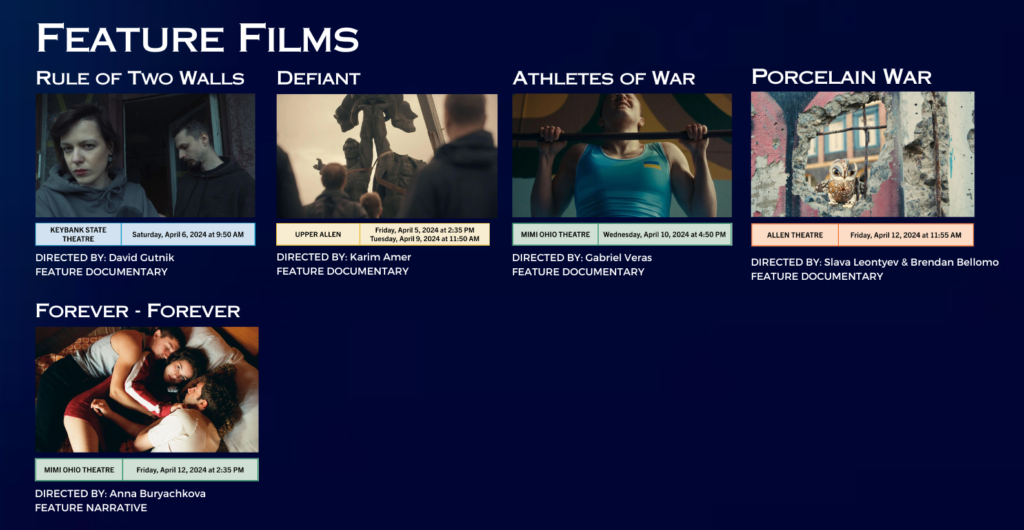
In-person: Sat April 6 | KeyBank State Theater
Online: April 14 – 21
In this harsh but elucidating doc, UkrainianAmerican filmmaker David Gunik trains his camera on the Ukrainian artists who have chosen to stay behind as Russia’s invasion rages on around them. By making their art, they hope to protect their embattled country’s own artistic culture, no matter how many bombs drop around them.
In-person: Fri April 5 | Upper Allen Theater
Tue April 9 | Upper Allen Theater
Online: April 14 – 21
There’s more than one way to fight a war. Witness the ongoing invasion of Ukraine from inside the battle-torn country’s administration through such officials as the Minister Of Foreign Affairs, the Vice Prime Minister, and the nation’s lead negotiator, as they attempt to broker peace.
In-person: Wed April 10 | Mimi Ohio Theater
Online: April 14 – 21
How does one fight for the gold when an endless war has taken away a generation of competitors and destroyed their facilities? Meet the dwindling number of Ukrainian athletes as they prepare for the 2024 Olympic Games in Paris, while trying to survive Russia’s violent invasion of their country.
In-person: Fri April 12 | Allen Theater
As the Russia-Ukraine war rages mere miles away, Kharkiv-based husband and wife team Slava Leontyev and Anya Stasenko make tiny porcelain figurines. What does it mean to continue with their artistic passions as the world crumbles around them? Winner of the Documentary Grand Jury Prize at Sundance 2024.
In-person: Fri April 12 | Mimi Ohio Theater
Online: April 14 – 21
Will you survive if nobody loves you? Get an uncompromising glimpse of troubled adolescent life in post-Communist Kyiv through Tonia, the new kid in school, as she tries to assimilate into her new world. But as a love triangle starts to form among the clique, will her past catch up with her?
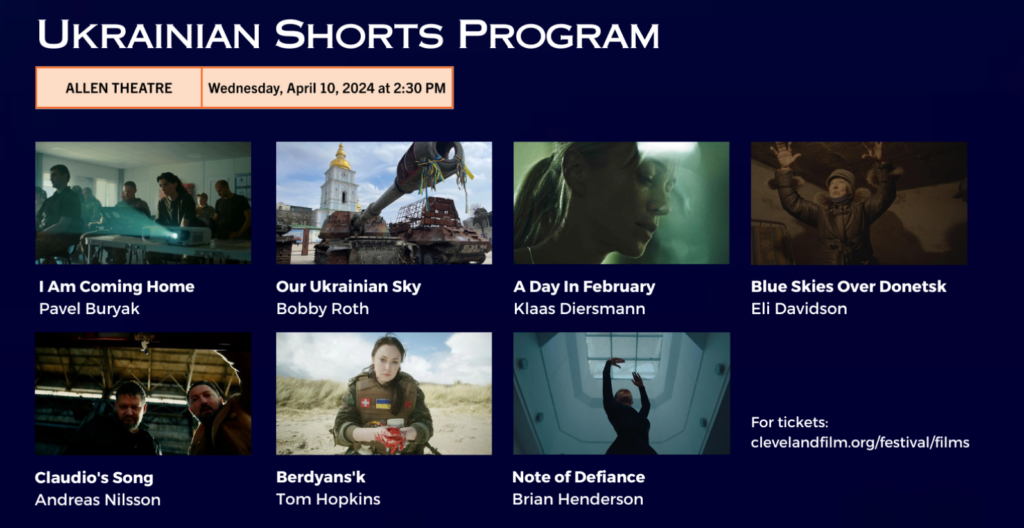
In-person: Wed April 10 | Allen Theater
Online: April 14 – 21
In a war-torn land, a courageous young woman joins the Ukrainian military forces as a sapper, determined to bring peace by clearing the land where she was born. Her journey defies conventions, showcasing the power of individual bravery amidst the chaos of the war.
An unlikely group of lawyers with no previous humanitarian experience, drive used pickup trucks into an active warzone.
In another country, separated from her family, one phone call is all Galyna has to ensure their safety.
A Ukrainian father delivers stoves to frontline families without power, all while attempting to create normalcy for his children growing up in a war zone.
A young man faces the wrath of a family of criminals that target people who are famous on the internet and extort money from them. When their scheme fails, the plan to kill him takes an unexpected turn.
Lera, a young Ukrainian refugee in Ireland, uses dark web seance software to connect with her sister who has just died on the front line.
Filmed in early 2023, on the Ukrainian-Russian border, this short documentary explores two artists’ use of their creativity and art as a means of cultural survival and defiance.
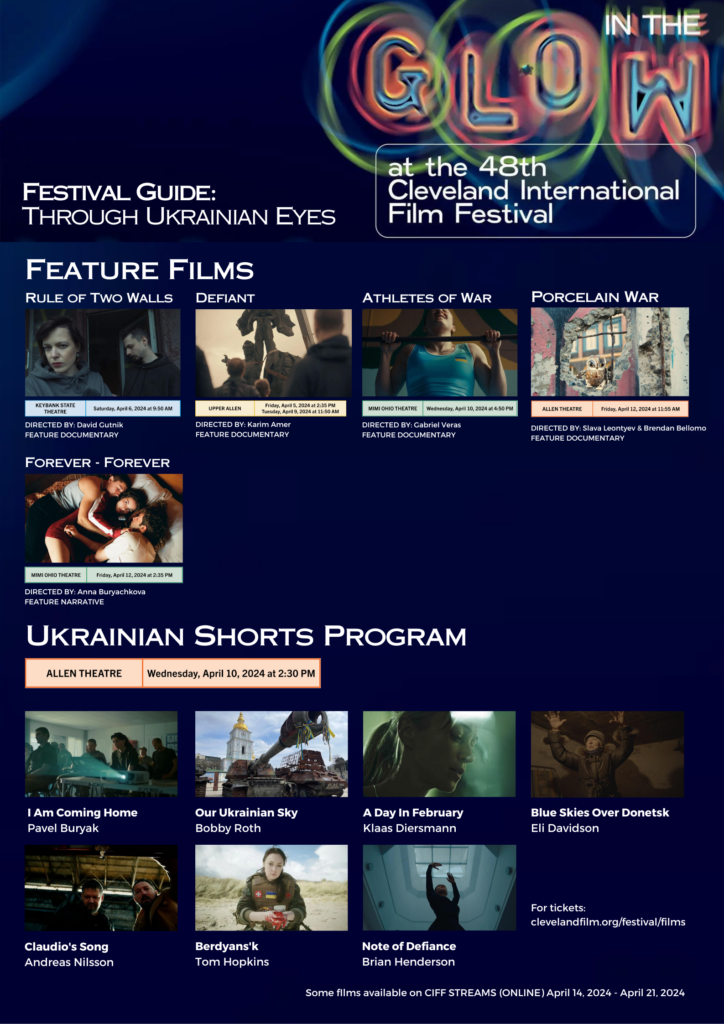
Make sure to follow our newsletter and social media for more announcements!
Together, we can prove to cultural programmers that Ukrainian stories are necessary and that there is a large audience ready for them.
Дивимось і читаймо Українське Разом!
Learn more about Razom efforts on the cultural diplomacy front within our Razom Culture project.
International Humanitarian Conference “New Medicine – Together” in Kyiv
The “New Medicine – Together” conference, organized under the auspices of the national humanitarian aid agency ZDOROVI and Razom, recently brought to Kyiv, Ukraine over a hundred representatives from the humanitarian and medical fields across Ukraine and abroad.
This gathering of representatives from the Ukrainian and international humanitarian and charitable sectors, was deemed incredibly important for the resilience and development of Ukrainian medicine today. The head of the Ministry of Health discussed the department’s work and the industry’s overall priority tasks.
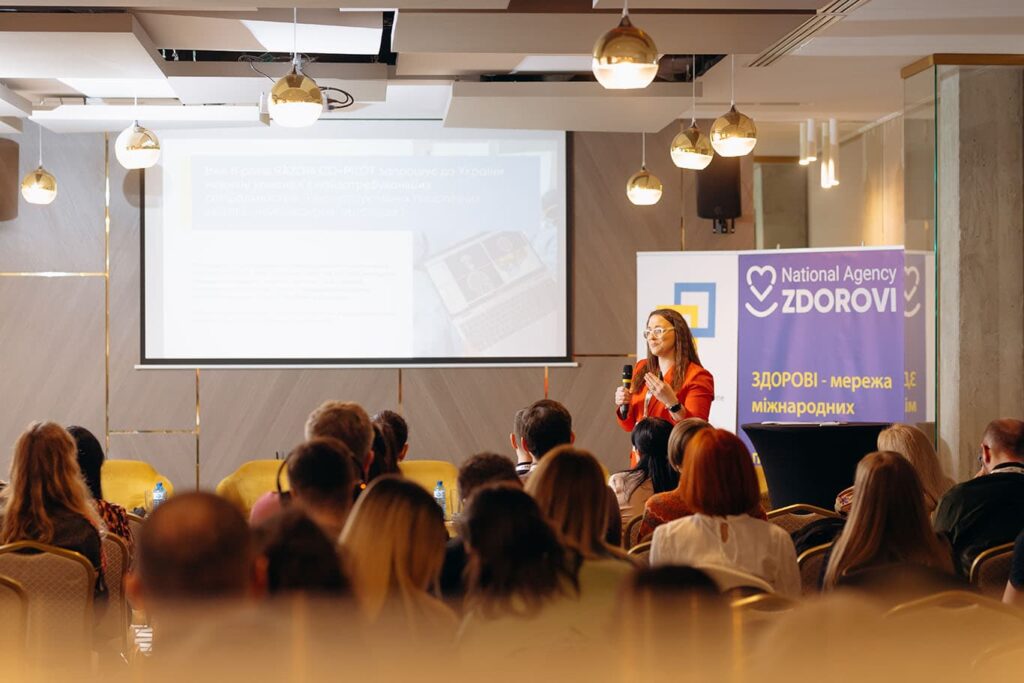
Natalia Husak, head of the National Health Service, presented conference participants with the results of the medical reform and innovative approaches to financing and procurement in the sector.
Speakers included representatives from the Ministry of Health, the National Health Service of Ukraine, the HEALTH CLUSTER OCHA, the Population Fund, charitable organizations like Razom, the International Medical Corps, ZDOROVI, Tabletochki, Patients of Ukraine, and others. Participants presented successful case studies of humanitarian response in light of today’s medical needs and requests.
The conference focused on:
- Assistance to servicemen, veterans, and victims of Russian aggression.
- Development of international partnerships.
- Mechanisms for managing humanitarian aid.
- Transformation of Ukrainian hospitals to international standards.
- Counteracting the destructive impact of military actions.
- Restoration of the medical sector.
- Improving accessibility and quality of medical services throughout Ukraine, etc.
“I am grateful to my colleagues for two days of fruitful joint work,” said Natalia Tulinova, founder of the National Humanitarian Aid Agency. “I am confident that the achievements and ideas we gained during this time will have a significant impact on the development of humanitarian partnerships and further support for doctors and patients in Ukraine.”
“We work every day to ensure Ukrainian medicine withstands the pressure of war, and as few people as possible lose the opportunity to receive timely and quality assistance. We face numerous challenges, but effective partnerships, sharing experiences, joint generation of new ideas and projects by responsible participants of the humanitarian, charitable, and medical sectors – this is an opportunity for all of us together to create a new Ukrainian medicine,” summed up Vitaliy Svichinsky, Director of Operations of Razom in Ukraine.
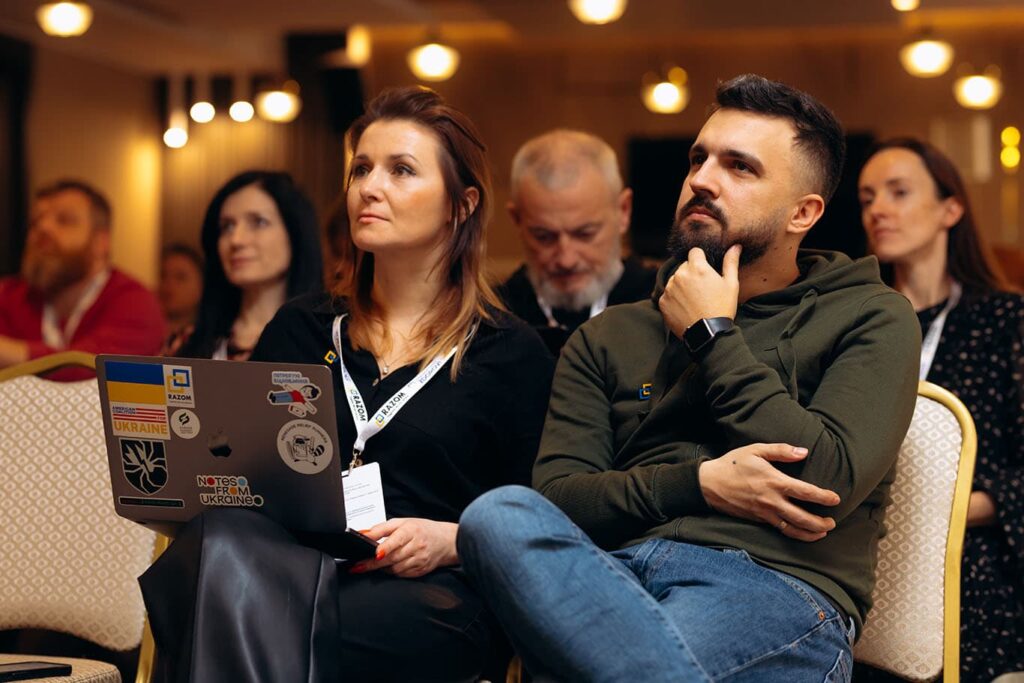
In addition to the formal program, event participants had an opportunity to engage in a community service project that the organizers dubbed “Sharing Bread”. Each attendee personally prepared treats for over a hundred residents of the Kyiv Nursing Home for Labor Veterans.
Razom is proud to have been involved in mounting this conference, an important aspect of our Health program, which aims to strengthen a modern Ukrainian healthcare system to serve Ukrainians now and after victory.
We invite you to learn more and support Razom Health.
Uprooted: How Razom and The Kyiv Independent brought stories of abducted Ukrainian children to American cities
In an effort to bring awareness to U.S. audiences about Russian war crimes against the youngest and most vulnerable Ukrainians, Razom recently collaborated with The Kyiv Independent, a leading English-language media outlet in Ukraine. The partnership produced a series of screenings and panel discussions of their documentary Uprooted, which investigates the illegal abduction and deportation of Ukrainian children from Mariupol by Russia.
The film tour lasted ten days and covered five cities: New York, Washington D.C., Houston, Austin and Phoenix. During this time, Razom together with its local partners arranged 7 screenings and 4 side events that engaged approximately 500 people around the U.S. in the conversation about this unimaginable war crime. We were honored to have the Kyiv Independent team represented by its CEO Daryna Shevchenko, Head of War Crimes Investigations, Yevheniia Motorevska and War Crime reporter, Olesia Bida.
The delegation brought with it a very special participant, Ivan Maktkovskyi, a protagonist in the documentary. Ivan was a young person trying to escape Mariupol but was intercepted and forcibly transferred by the occupying forces to Donetsk. Fortunately, Ivan managed to report his location and was returned to Ukraine. However, his peers were taken to Russia against their will. Now, Ivan considers his mission to be that of acting as the voice for those children who were abducted by Russia to help them return to Ukraine.
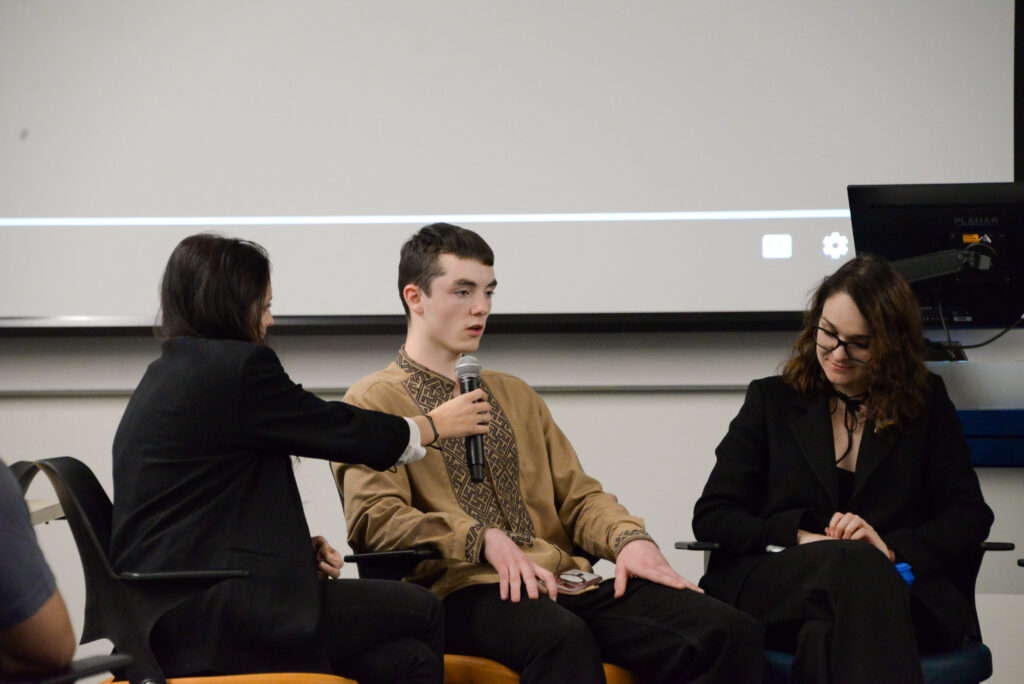
Ivan’s testimony added value to every event and touched everyone who heard his story.
Experts on the topic contributed to the conversion in each city on the tour.
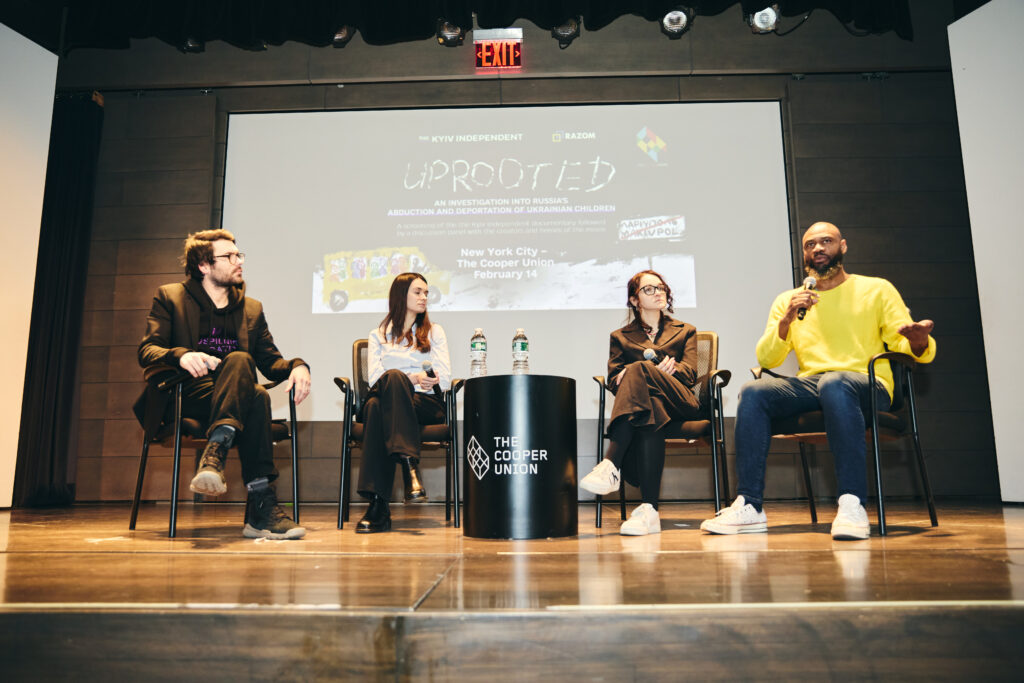
In New York, we were joined by a journalist and host of the “Black Diplomat” podcast Terrell Jermaine Starr who explained the Russian invasion of Ukraine through the universal practices of oppression. During the screening at Columbia University, Permanent Representative of Ukraine to the United Nations, Ambassador Serhiy Kyslytsya joined the conversation moderated by Katya Soldak, a journalist at Forbes, to share his experience of working on the crime of child abduction at the U.N.
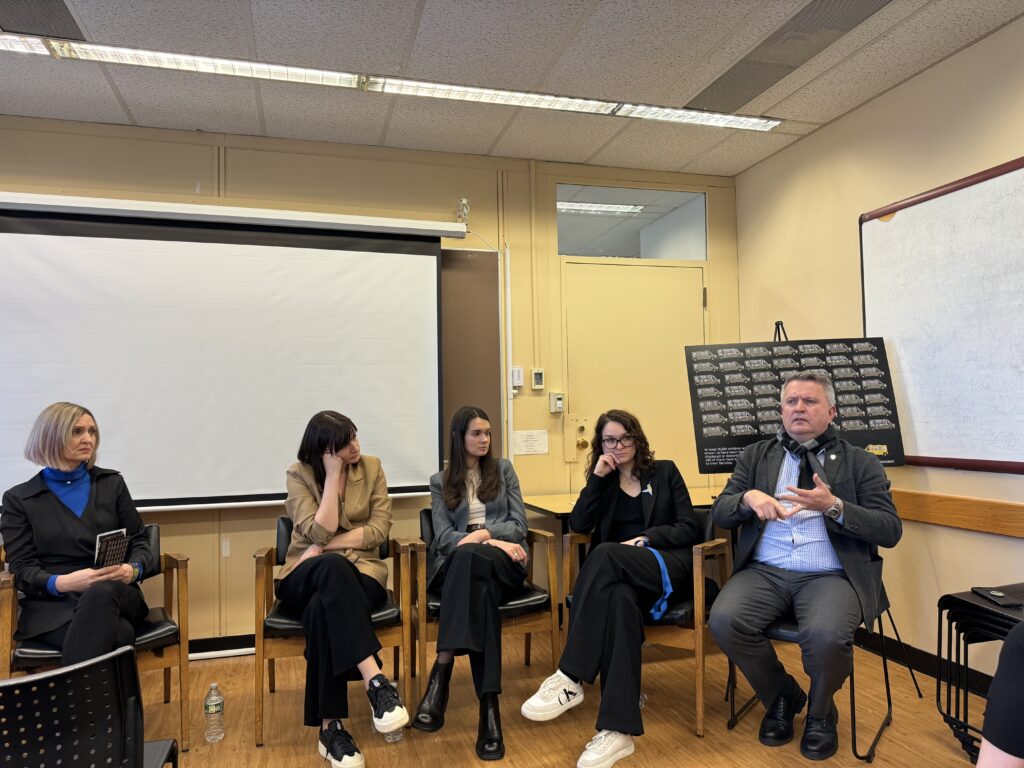
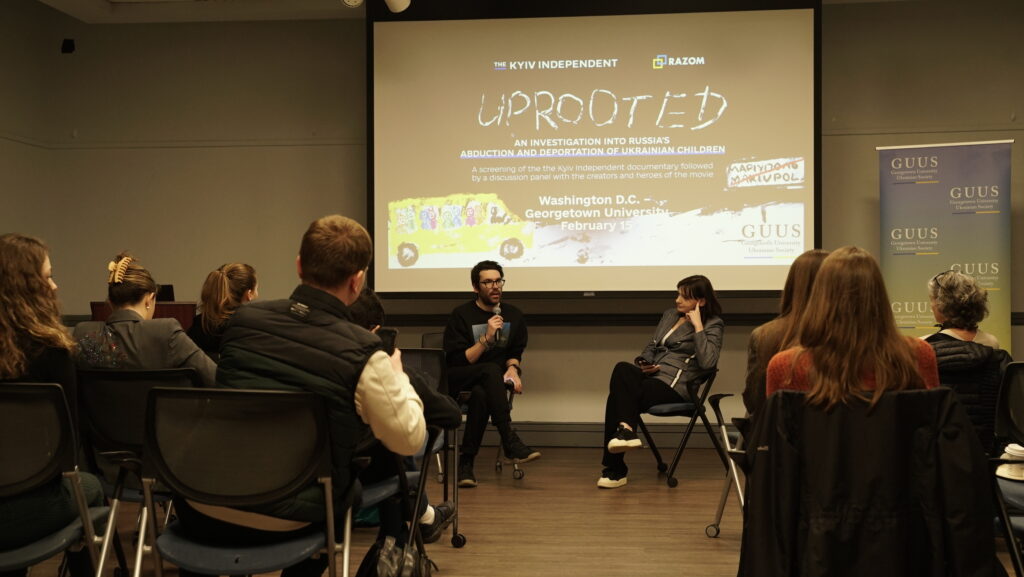
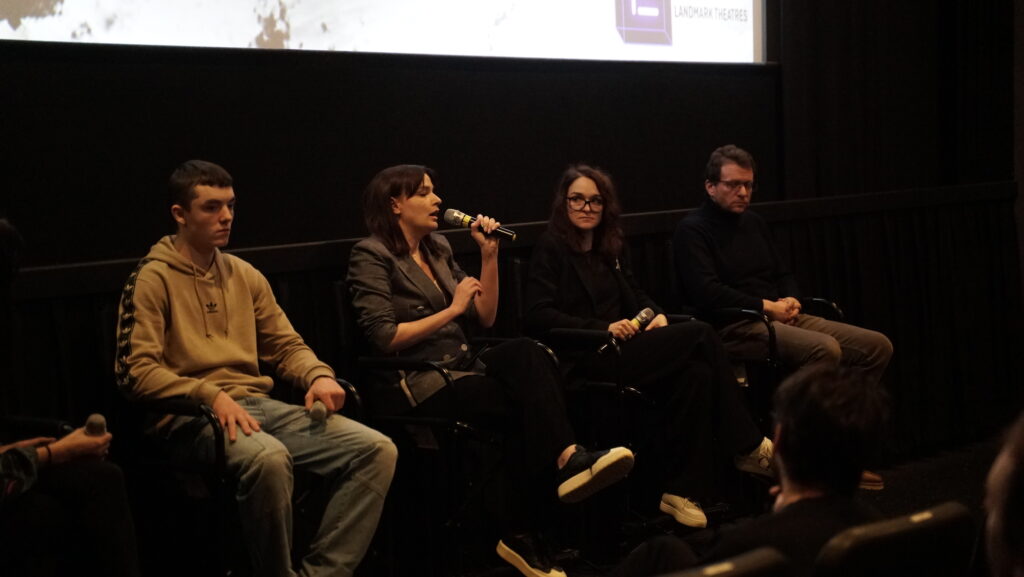
A writer and executive editor at the Reckoning Project, Peter Pometanzev contributed to the panel in Washington, D.C. by explaining how Russia uses the abduction of children in its propaganda.

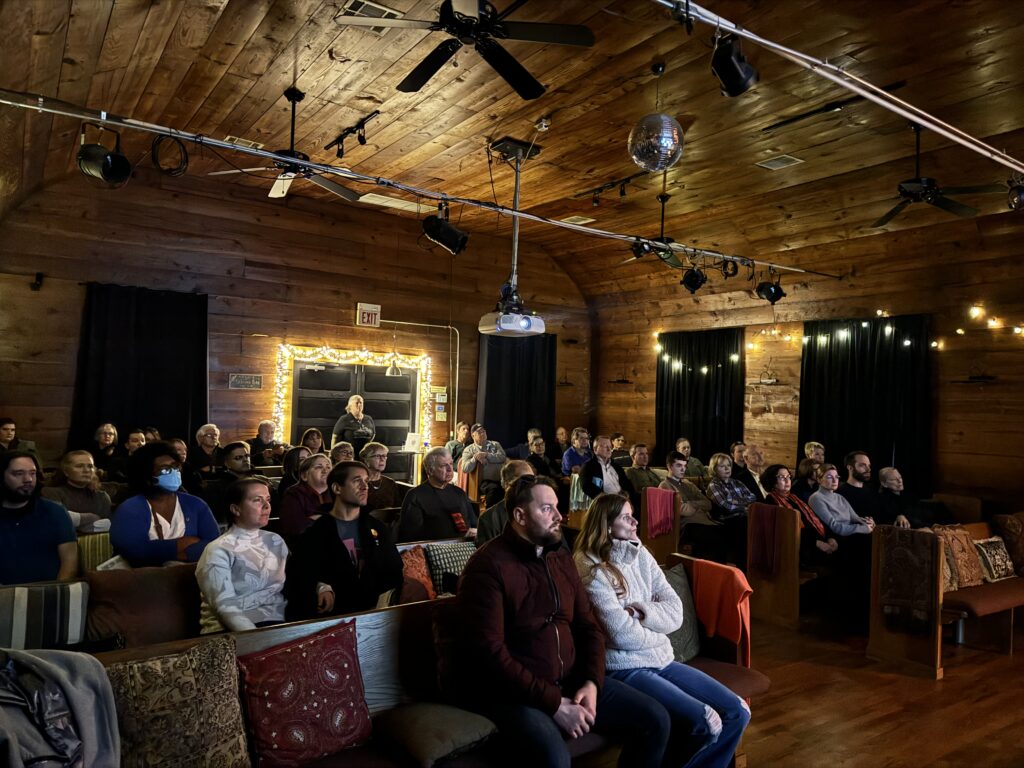
A historian and researcher of former Soviet countries, Kimberly St. Julian-Varnon shared her expertise on the history of Russian colonialism in Ukraine, at an intimate discussion in Houston.
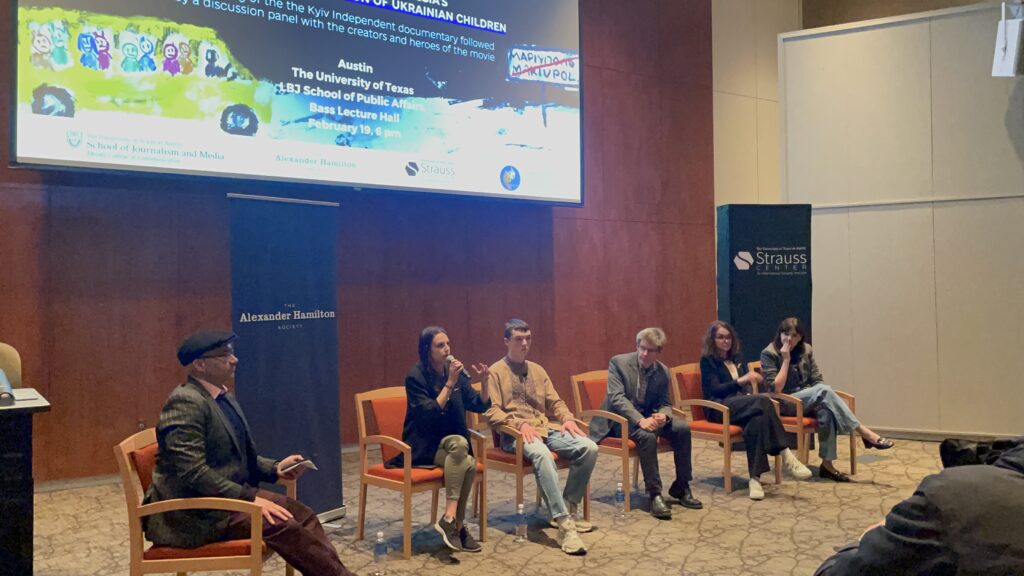
Nathan Mark Hutson from the LBJ School of Public Affairs and Steven Seegel from the Center for East European, and Eurasian Studies joined the panel at The University of Texas at Austin.
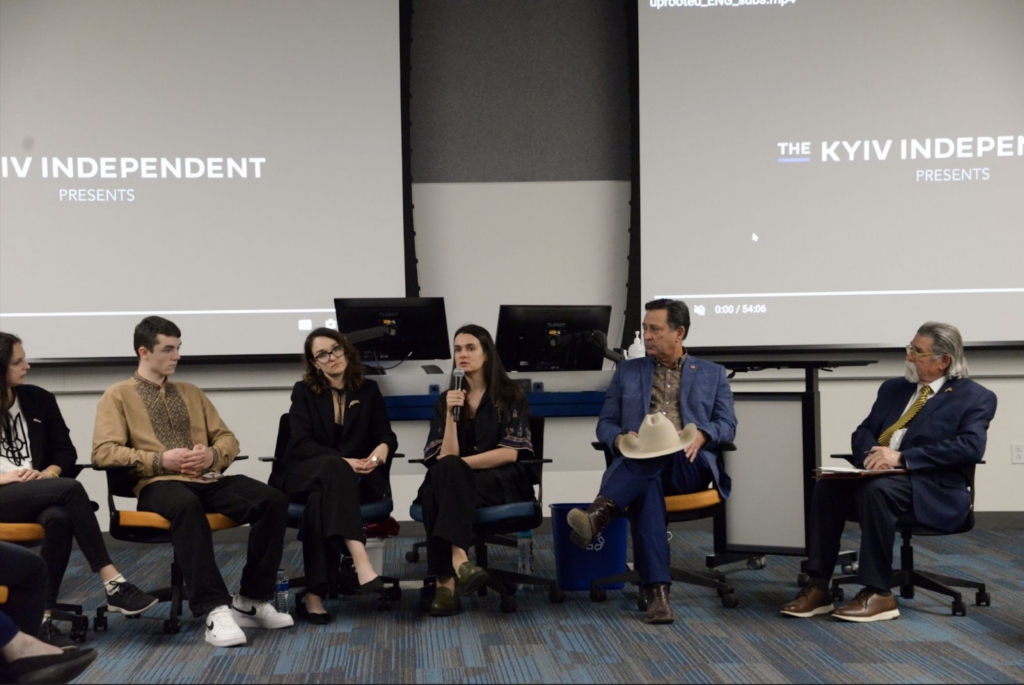
In Phoenix we were honored to have State Congressman David Cook sharing his experience of visiting Ukraine, and a local activist, Orest Jejna.
Representatives of the Embassy of Ukraine to the United States were able to join the screenings in Washington, D.C., and Houston.
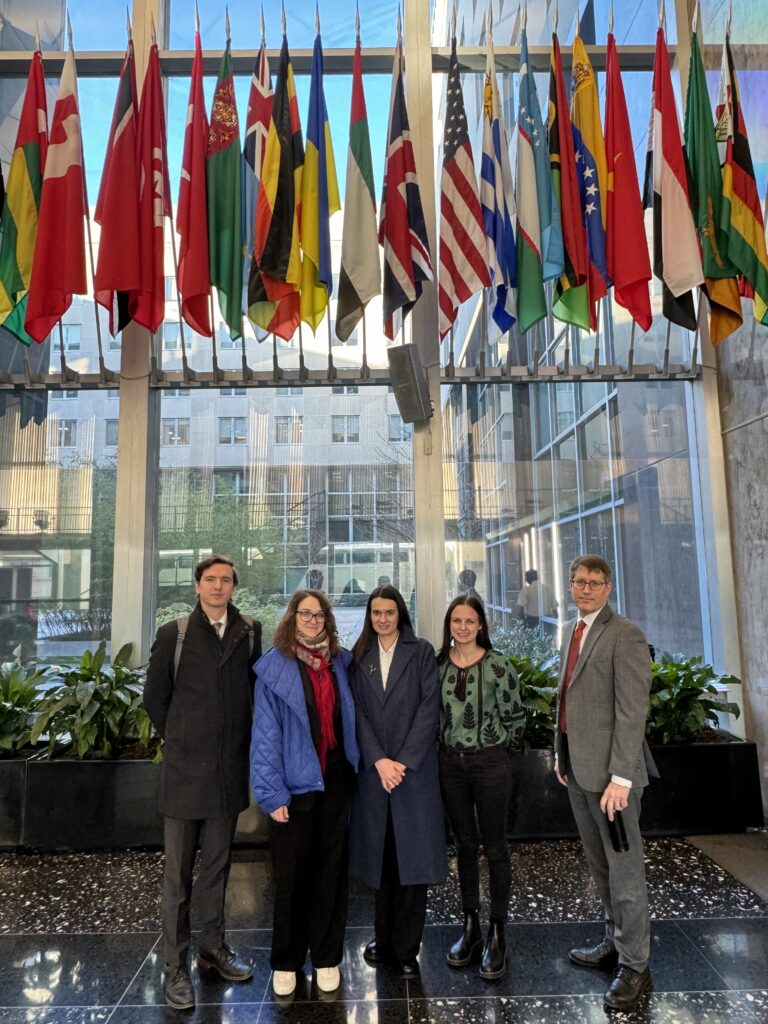
During the tour, the delegation had a chance to meet with the Office of Congresswoman Pramila Jayapal in Washington, D.C., representatives from the State Department, Senator John Cornyn’s Regional Office in Austin, and have a personal meeting with Congresswoman Debbie Lesko in Phoenix.
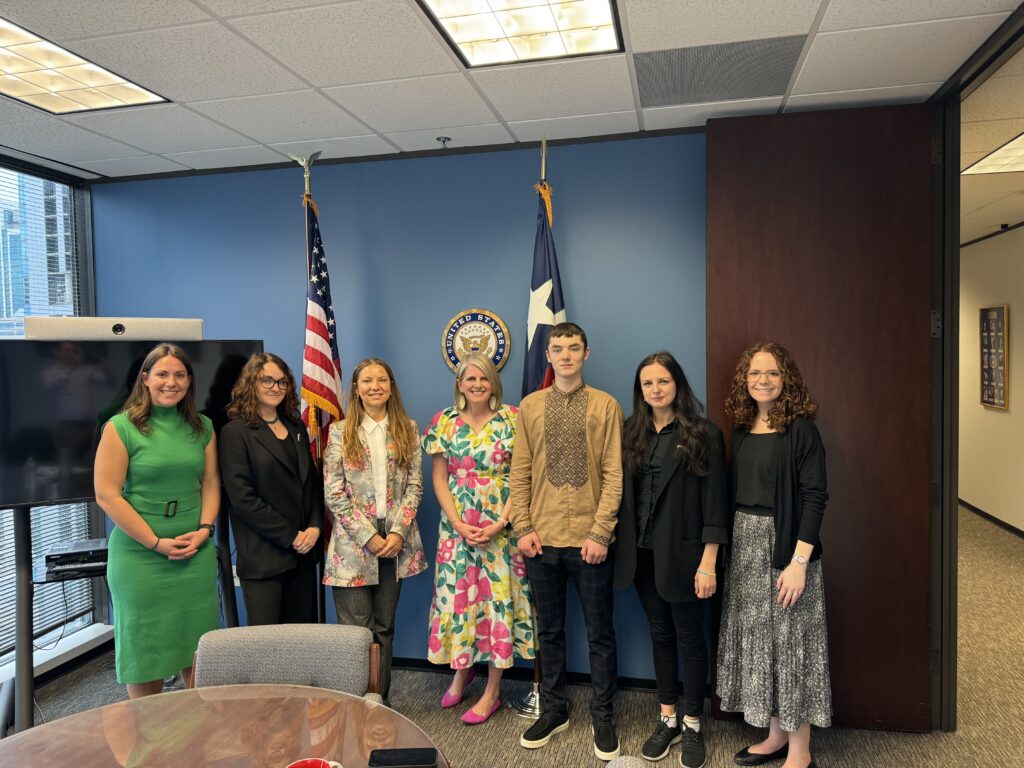
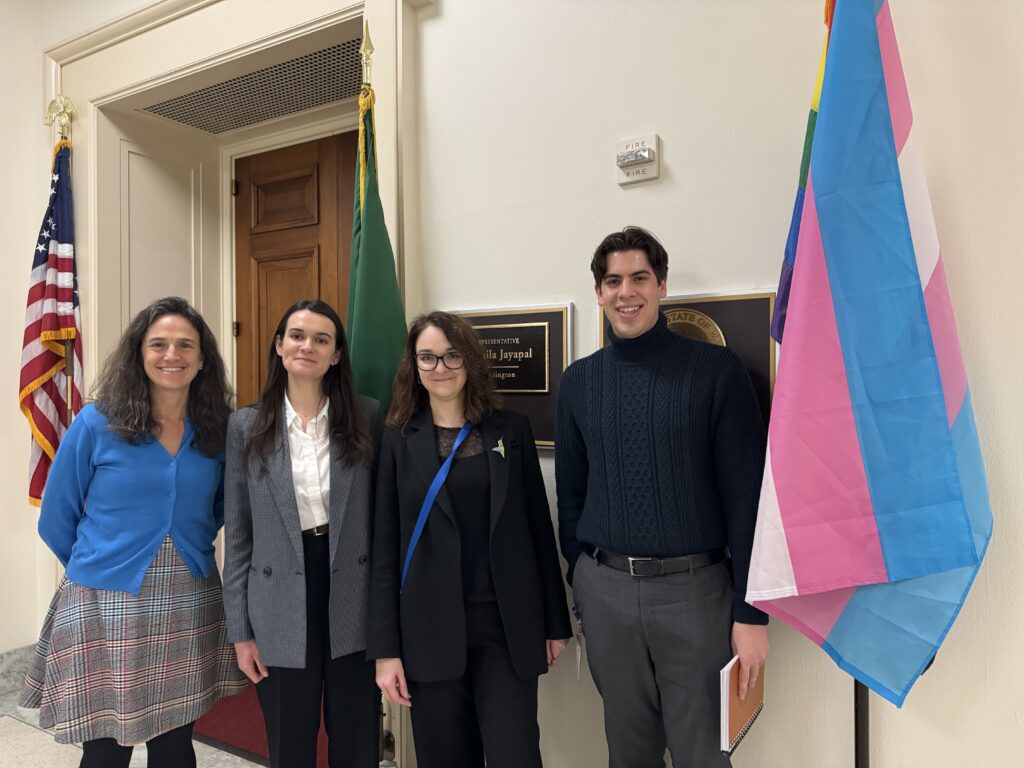
During the meetings, the delegation briefed officials on the issue of the abduction of Ukrainian children by Russia and the appropriate legislative and policy actions that the U.S. can take to help Ukraine.
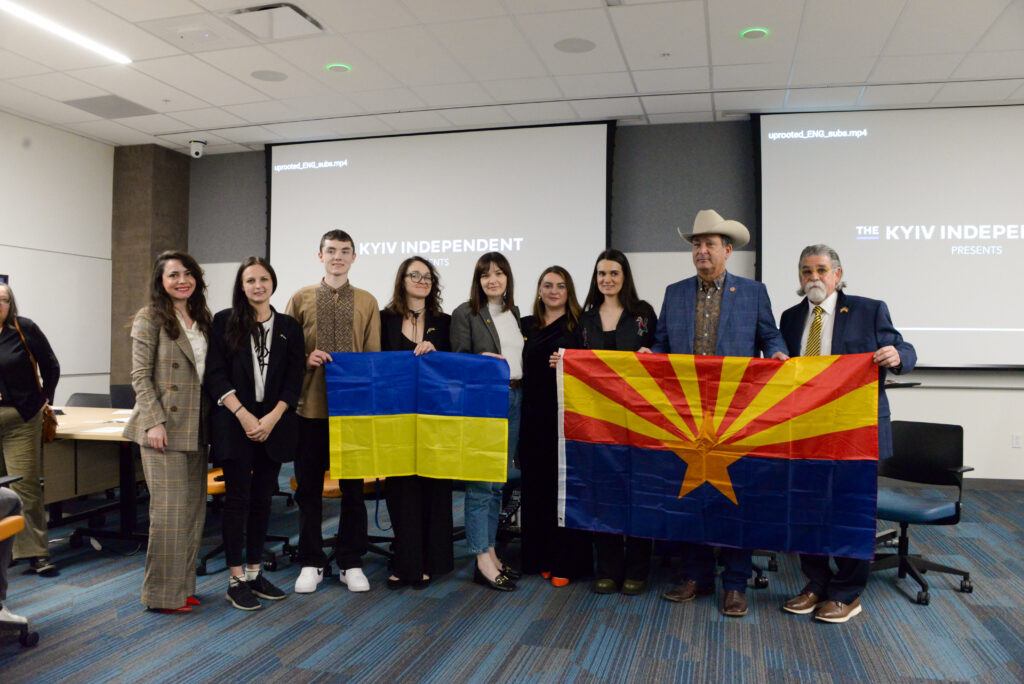
In addition to the screening, the delegation participated in side events including a closed networking opportunity for journalists and an open house at the Ukrainian Institute of America.
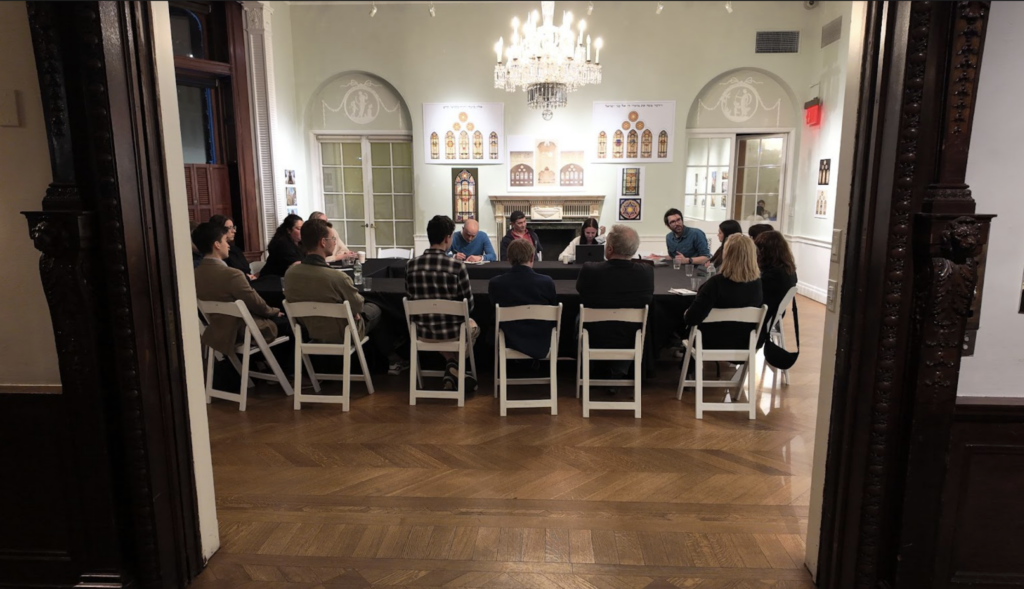
We held meetings with prominent think tanks in Washington, D.C., like the Wilson Center, CEPA and USIP. In Phoenix, a panel discussion was held at the German-speaking community center, Treffpunkt. Side events allowed the participants to expand their conversation with the public and exchange experiences with their colleagues.
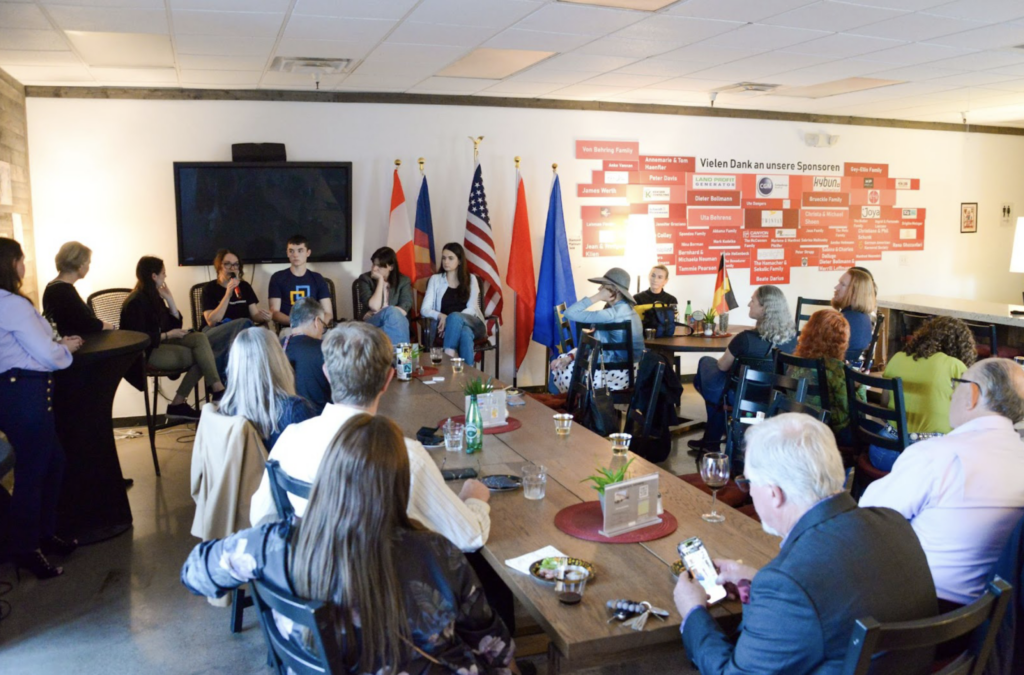
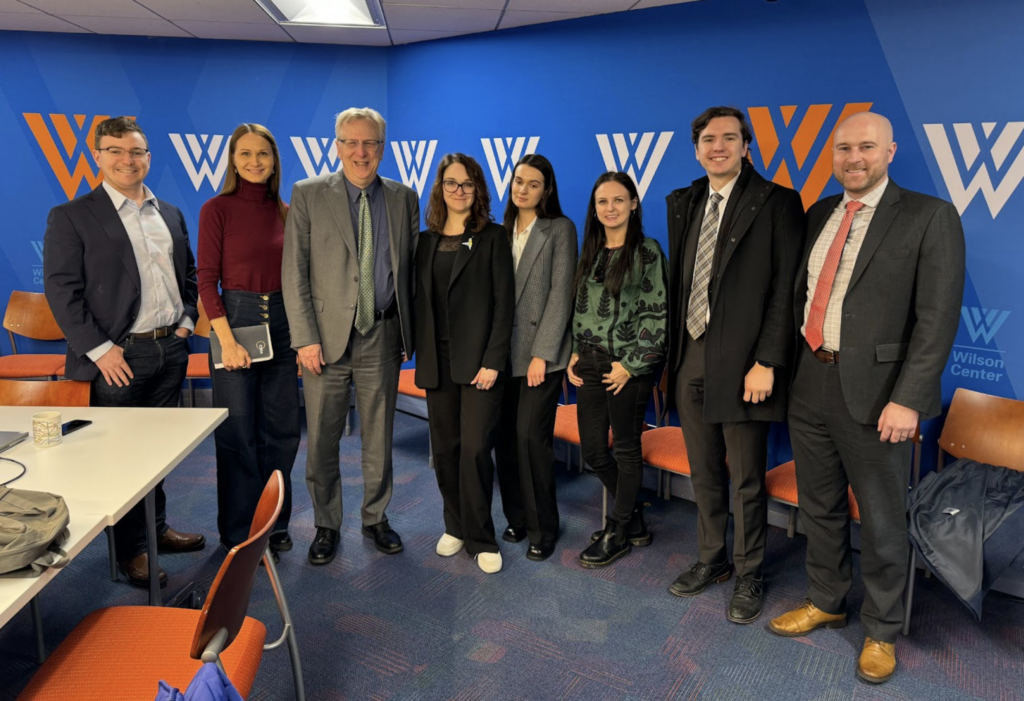
The tour attracted the attention of the local media and resulted in multiple interviews by KXAN, Northeast Valley News, Arizona Central and others.
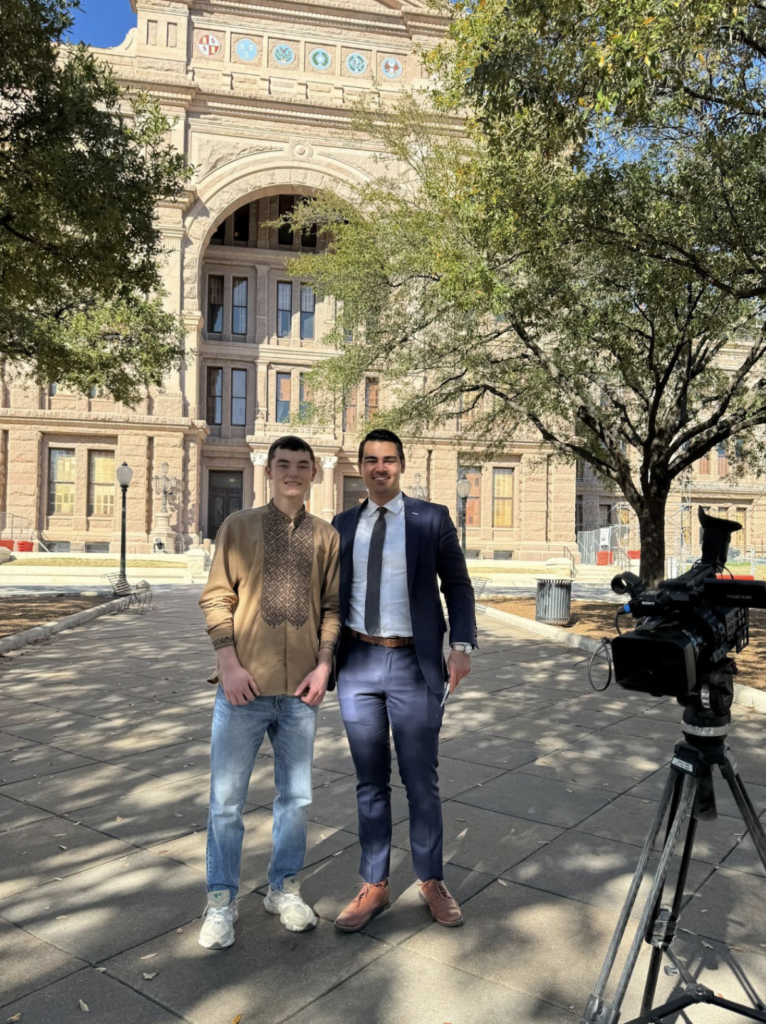
A special treat during the tour was Ivan’s meeting with Gilbert Tuhabonye — a survivor of the genocide during the Burundian Civil War, a long-distance runner, and author of This Voice in My Heart: A Runner’s Memoir of Genocide, Faith, and Forgiveness.
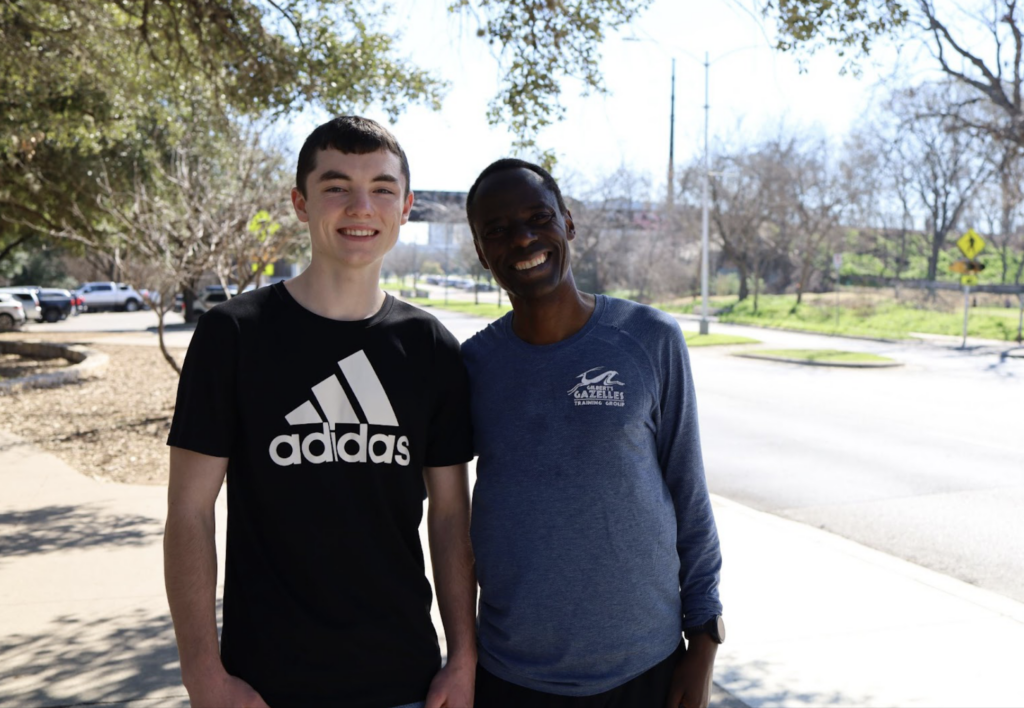
A quick conversation between the two grew into a joint run the next morning in Austin, and inspired Ivan to journal about his experience of abduction.
The tour increased awareness about the crime of abduction of Ukrainian children by Russia and exposed Russian atrocities in occupied territories as yet another reason to support Ukraine in its fight for freedom.
This tour would not have been possible without the dedicated Razom team behind it and Razom’s wonderful partners. We would like to thank the following people and organizations for contributing to the organization of the tour:
- The Cooper Union
- Ukrainian Institute of America
- Human Rights Foundation
- Georgetown University Ukrainian Society
- Columbia University Ukrainian Club
- UT Austin School of Journalism and Media, The LBJ School of Public Affairs, The Alexander Hamilton Society, The Strauss Center for International Security and Law, UT Austin Center for East European and Eurasian Studies
- 14 pews in Houston
- Cactus & Tryzub
- Phoenix Committee on Foreign Relations
- Treffpunkt
- UNWLA
- Houston for Ukraine (HTX4Ukraine)
Feel free to organize screenings of Uprooted in your community. Watch the documentary on Kyiv Independent’s YouTube.
Together, we can demand accountability for stolen childhoods!
Winter Preparedness Grants Make a Difference for Thousands
The war in Ukraine has brought immense hardship, and winter only exacerbated the challenges faced by many communities. Damaged infrastructure and limited resources had left residents vulnerable to the harsh realities of a cold season. This winter, Razom Relief partnered with Ukrainian organizations to provide crucial winter aid, delivering items like firewood, power banks, blankets, gas cookers, and aiding in house insulation and windows, and roof renovations. In this article, we aim to spotlight three of such organizations.
Razom x Bilozerskyi Center for Regional Development
Razom provided funds to the Bilozerskyi Center for Regional Development to distribute winter supplies in Bilozerka and Stanislav. These communities endured a 9-month occupation and, even after liberation, they continue to face the constant threat of artillery shelling. Those who could evacuate did so. Mostly elderly people, large families, and individuals with disabilities remained. Securing their most fundamental needs is an ongoing struggle, particularly during the harsh winter months.
This project provided 44 families with fuel briquettes for heating and 70 families with essential winter kits, including flashlights, thermoses, portable gas stoves, blankets, and socks.
Tetiana Buzhenko, humanitarian staff member at the Bilozerskyi Center for Regional Development:
“I am amazed at how grateful our fellow villagers are for the help they receive. Some cry, others constantly express thanks. It feels like their cherished dream has come true. It is also sad at the same time, because you understand that people need simple things that they did not think about before, and now they are not able to afford them. Did anyone ever think that we would need portable stoves or flashlights?! I am glad that I can help my fellow countrymen!”
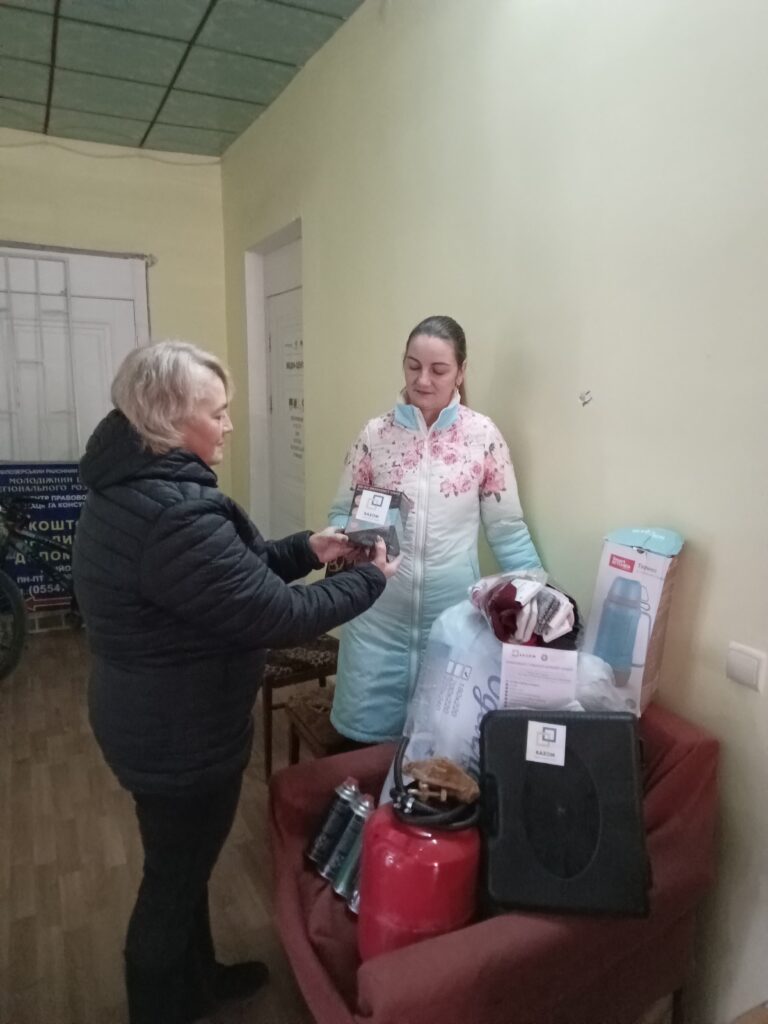
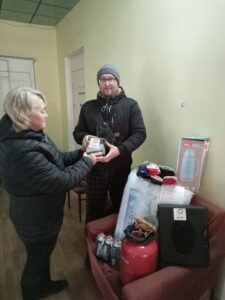
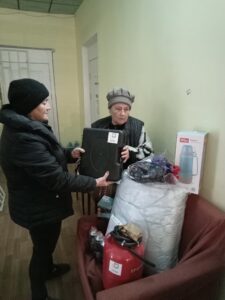
Kateryna Okseniuk, Head of humanitarian staff at the Bilozerskyi Center for Regional Development:
“The humanitarian direction in our organization is new, but quite powerful. During all of 2023, we worked tirelessly to help our communities improve their living conditions, meet the needs of residents so that necessary things like medicines and goods were available to them. Frankly speaking, it is not easy, but we understand that if we have the opportunity to help, we cannot neglect it. This project shows how much we are needed by our fellow countrymen and how vulnerable they are now.”
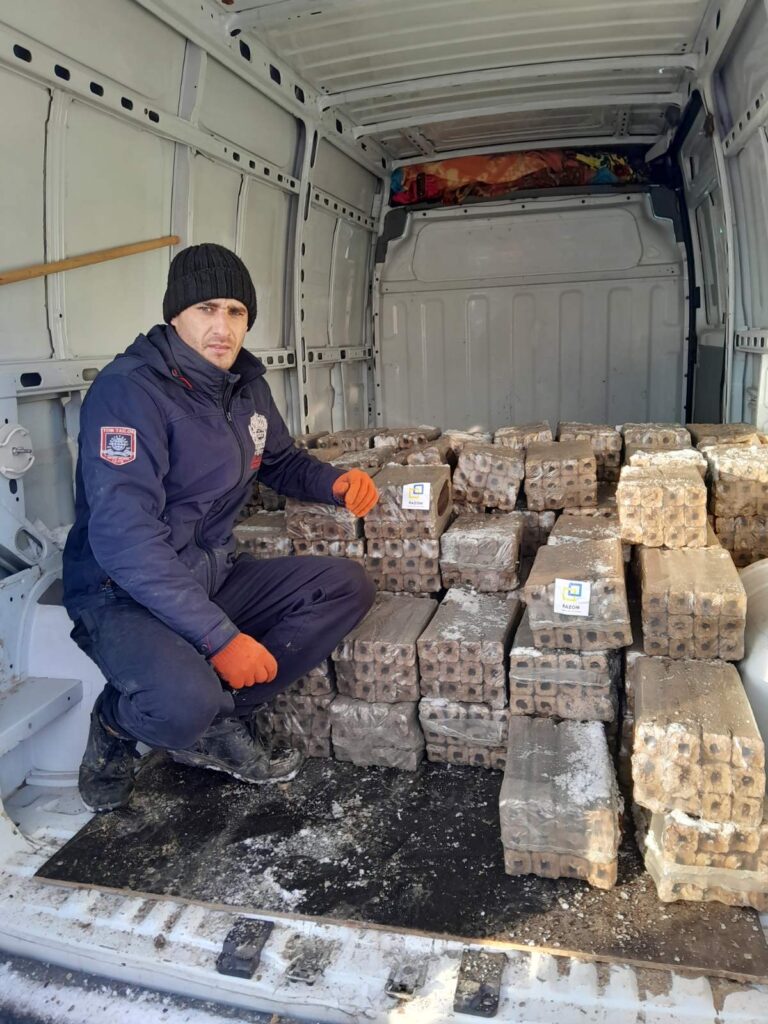
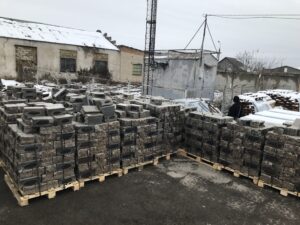
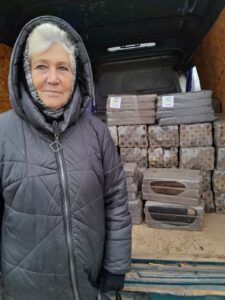
Razom x Nove Misto
Nove Misto Charity Foundation is an organization established in 2022 dedicated to providing vital humanitarian aid in Ukraine. Led by construction expert Kyrylo Hordiienko, Nove Misto focuses on restoring damaged civilian structures, ensuring access to utilities, clearing debris, and assisting animals in need.
In areas like the Kharkiv region, frequently targeted by Russian forces, Razom supported Nove Misto in replacing windows for 21 households. This seemingly simple project provided vital repairs for families struggling with the harsh winter conditions. Damaged windows meant more than just drafts and discomfort; they symbolized compromised safety, increased vulnerability, and a constant reminder of the ongoing struggle.
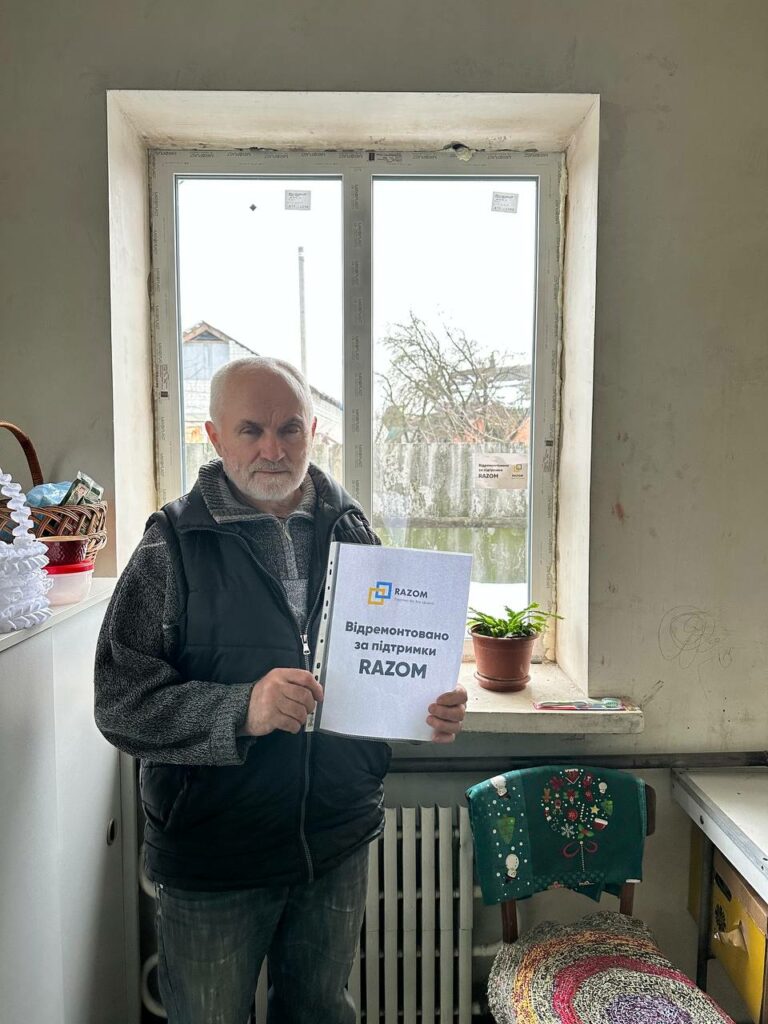
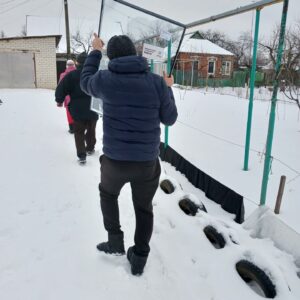
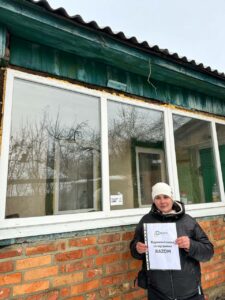
In the village of Tsupivka, Kharkiv region, Mrs. Nadiya Pavlivna’s story is a testament to the impact of Razom Relief’s initiatives. Faced with a harsh winter and broken windows in her house, she felt hopeless. However, with Razom’s support, Nove Misto replaced her windows, bringing warmth and comfort back to her home.
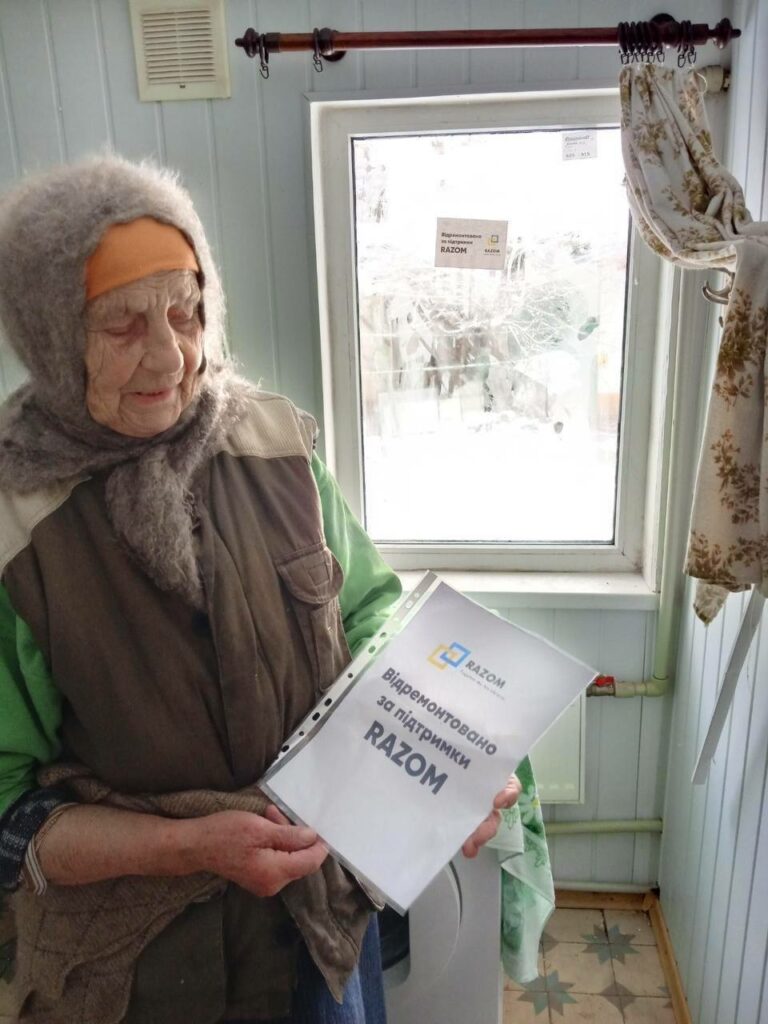
“Life in the village of Tsupivka has never been easy, but recent years have turned it into a real challenge. My house has suffered serious damage and was deteriorating with each day. Winter was approaching, and the windows were broken. I lost hope that I would be able to change anything because my resources were limited. One day, I discovered the Nove Misto and Razom’s project. Their team arrived and replaced the windows, bringing back warmth and comfort to my home. The gratitude I feel cannot be expressed in words. This is not just a window replacement, it is a return of home and hope.”
In another impactful case, after Mrs. Lyubov Fedorivna’s home was damaged by shelling, she struggled to survive the cold and drafts. Nove Misto not only replaced her windows but also provided building materials, food, and hygiene kits – essential resources for maintaining dignity and moving forward with her life.
“After the shelling in our village of Prudyanka, my life stopped. My small house, which was my fortress, was damaged by shelling. Living in such conditions, in the cold and drafts, was almost impossible. I prayed every day for a miracle, and one day my prayers were answered. When representatives of Nove Misto came to me, I could hardly believe in the reality of their help. They not only replaced the damaged windows, but also provided building materials for repairs, as well as food and hygiene kits that were so needed.
From now on, looking through the new clean windows, I see not only the village, but also a bright future. Words of gratitude sound in my heart every day.”
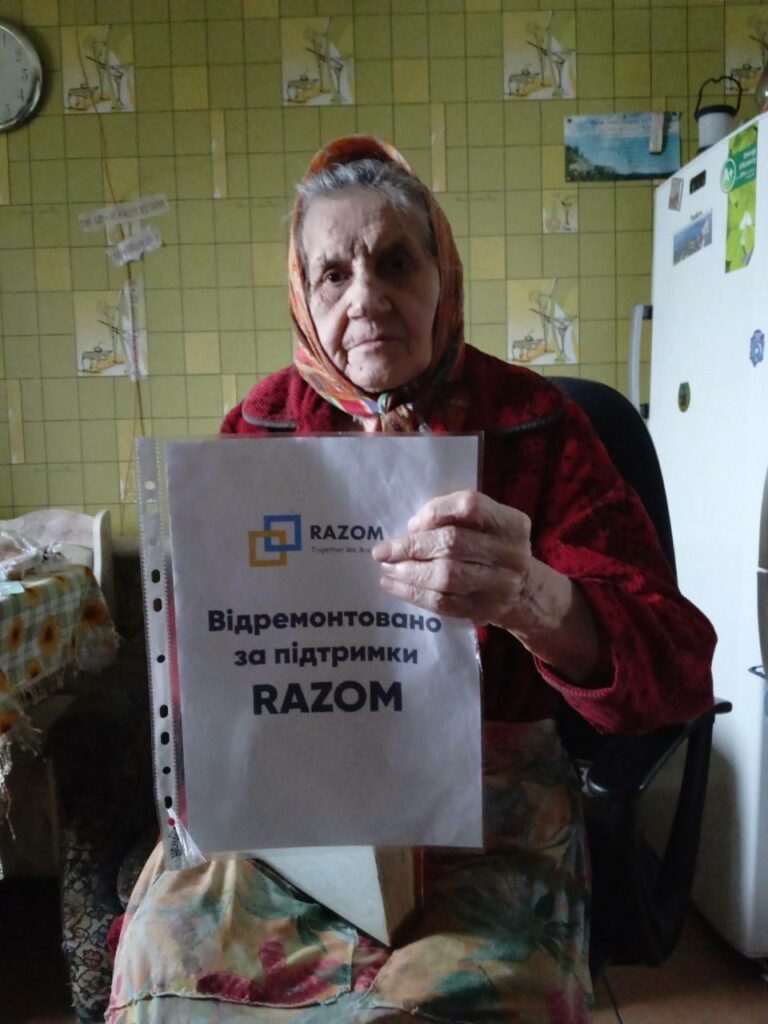
Razom x Nabutok
Razom is also partnering with Nabutok, a volunteer-driven organization providing indispensable support to Ukrainians on the front lines and in war-torn areas of eastern Ukraine. Since April 2022, they have delivered over 300 tons of humanitarian aid, making 82 trips to deliver critical supplies to these regions.
“We cannot stand aside,” says Serhiy, the head of Nabutok. “Thanks to partnerships like this, we’ve helped evacuate a lot of families and provided vital resources to countless others.”
Razom awarded a grant to Nabutok to deliver essential winter supplies to families in Krasnohorivka, a frontline settlement in Donetsk Oblast. The grant funded the purchase and distribution of items like flashlights, warmers, power banks, firewood, and blankets, providing a lifeline to approximately 230 families.
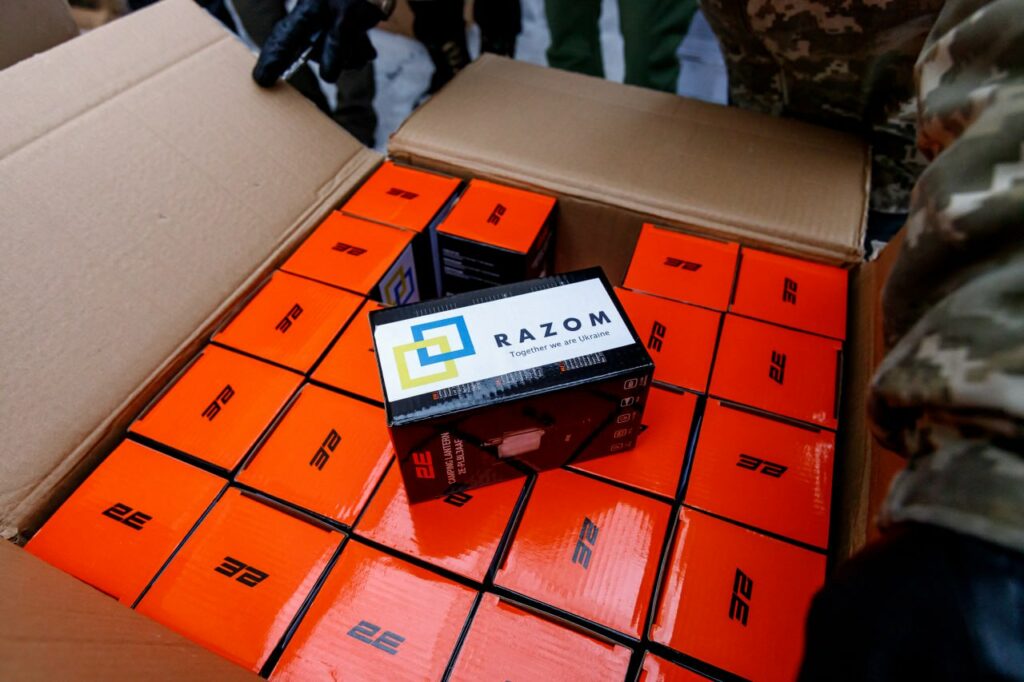
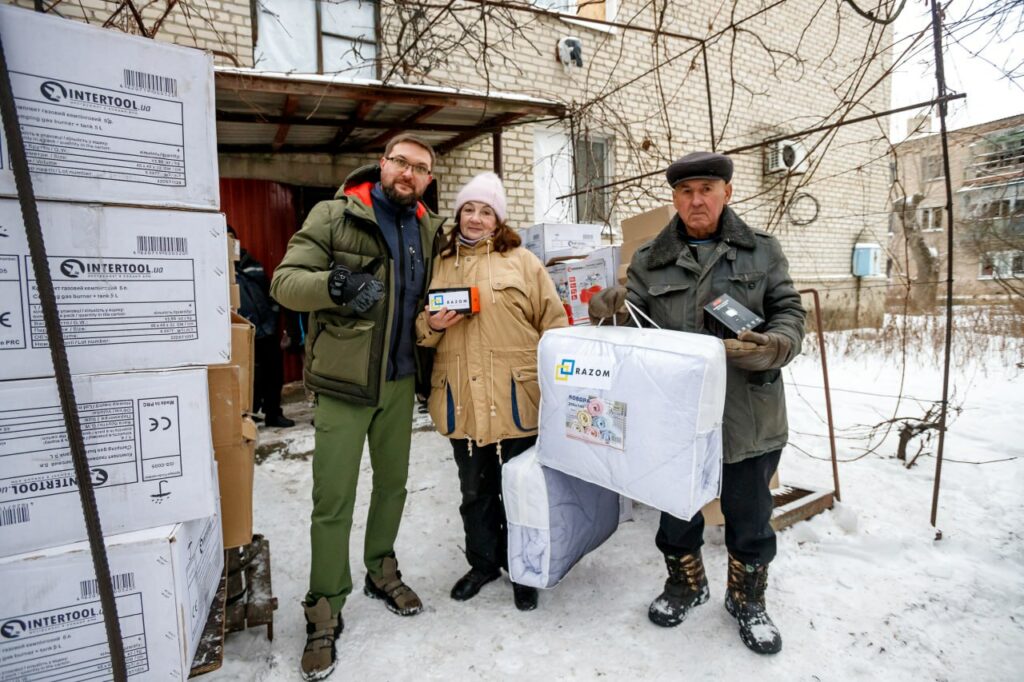
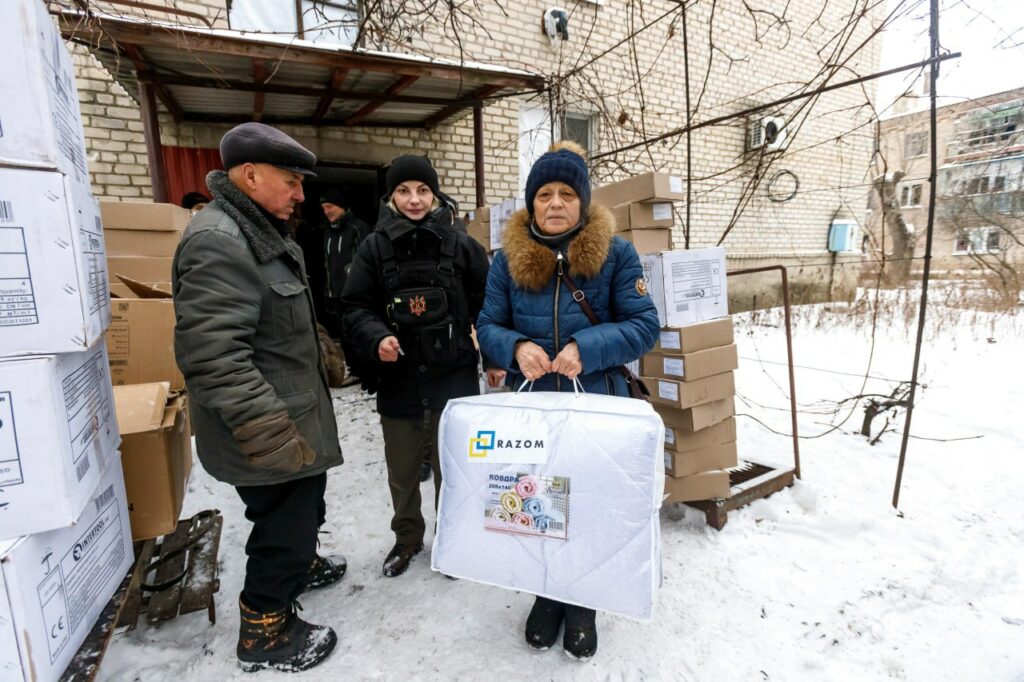
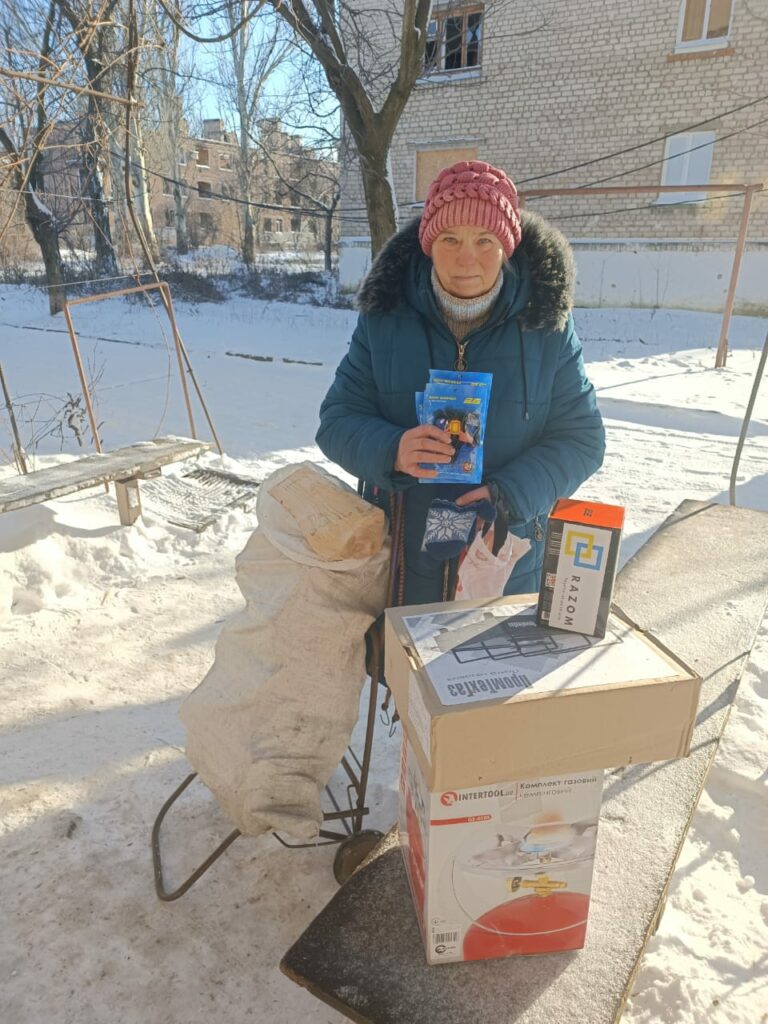
Nabutok’s unwavering commitment inspires us all. Their dedication, along with the support of Razom and its donors, makes a tangible difference in the lives of Ukrainians facing immense hardship.
The fight for Ukraine continues, but Razom remains dedicated to working with organizations like Nove Misto, Bilozerskyi Center for Regional Development and Nabutok who are providing life-saving assistance on the ground.
Here’s how you can help:
- Donate: Your contributions allow Razom to continue supporting frontline communities and providing essential supplies.
- Spread Awareness: Share this story and others like it to raise awareness about the ongoing humanitarian crisis in Ukraine.
- Stay Informed: Visit the Razom website for regular updates and opportunities to get involved.
Together, we can stand with the courageous people of Ukraine and ensure they have the resources they need.
We invite you to learn more and support Razom’s Relief Program.
Razom Presents Stabnet: The First Mobile Stabilization Points for Frontline Medics
The mobile stabilization container, Stabnet, aims to help save severely wounded individuals on the front lines. Medical brigades estimate that 50% of those wounded cannot be saved due to delayed evacuation and lack of proper facilities. Stabnet aims to provide frontline medical assistance by offering a compact, autonomous solution.
“The idea arose during volunteer trips providing ambulances and equipment,” said French volunteer Damien Arri-Maren. “The design borrows from existing mobile units and can be quickly delivered by a pickup truck, saving crucial time.”
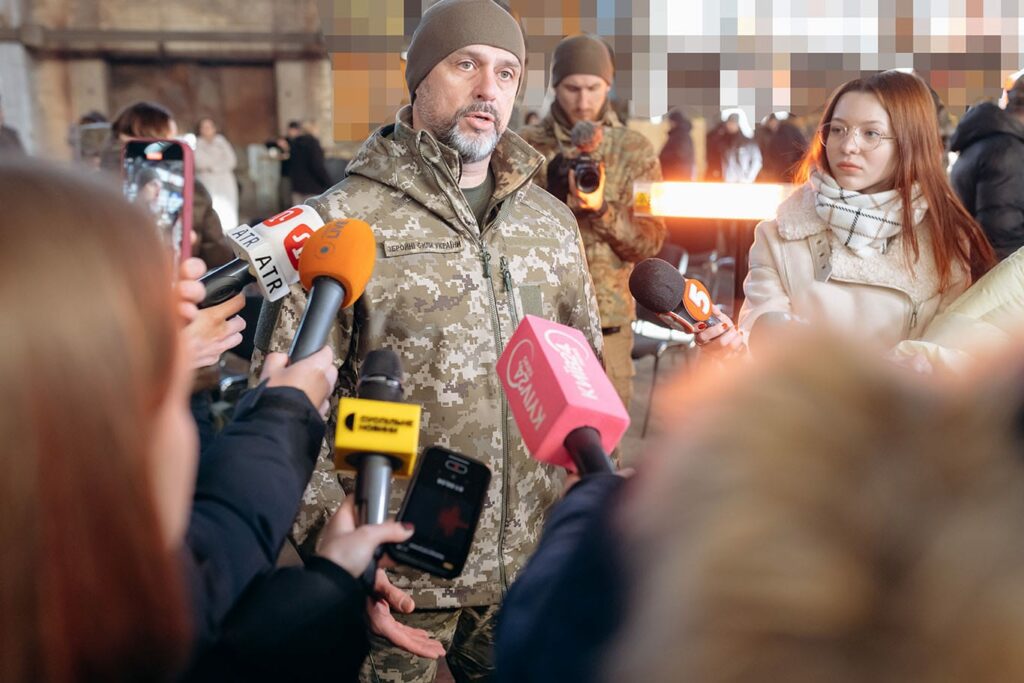
“Our goal is to offer swift aid,” Evelina Kurilets, Executive Director of Razom in Ukraine, shared. Colonel Oleksandr Tomak added that our heroes often receive care in unsuitable conditions, highlighting the need for a network of these containers.
“Distance between the battlefield and stabilization points is significant, leading to longer evacuation times and, unfortunately, preventable losses,” Tomak noted. “Prompt and proper care can also reduce amputations from infections.”
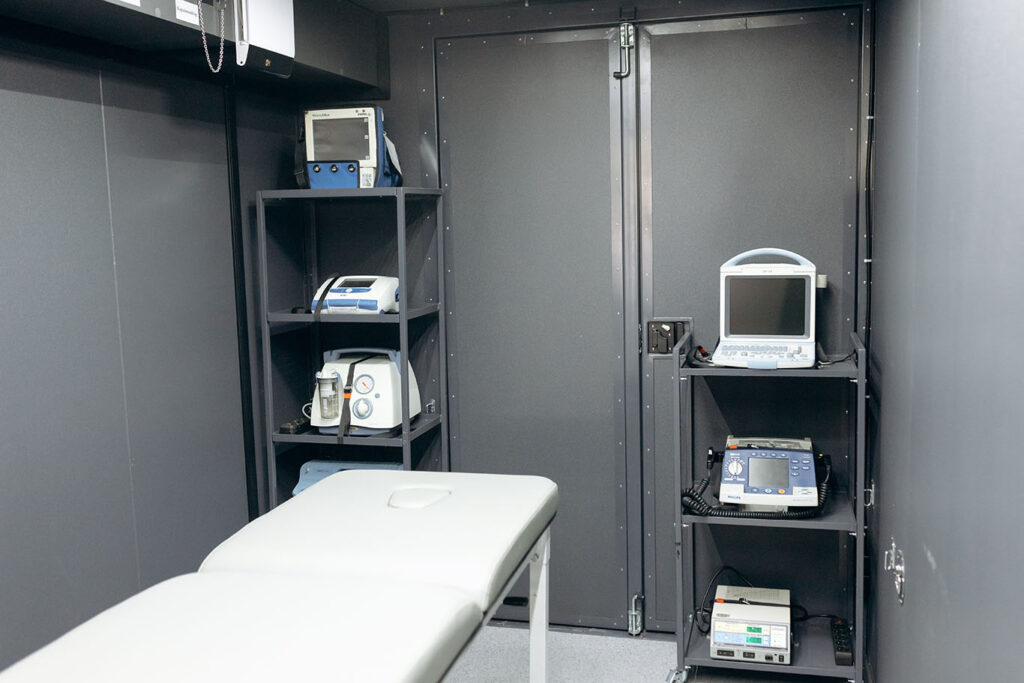
The first pilot container was supported by Razom. Developers consulted with medical brigades during development. The container offers autonomous operation through water tanks and generators and features a full suite of essential medical equipment for emergency stabilization.
“We have equipment for oxygenation, intubation, ventilation, defibrillation, vital signs monitoring, ultrasounds, and bleeding control,” explained surgeon Captain Lyudmila Sakali. “Additionally, there’s a sterilizer, sink, and refrigerator for medicines and blood products.”
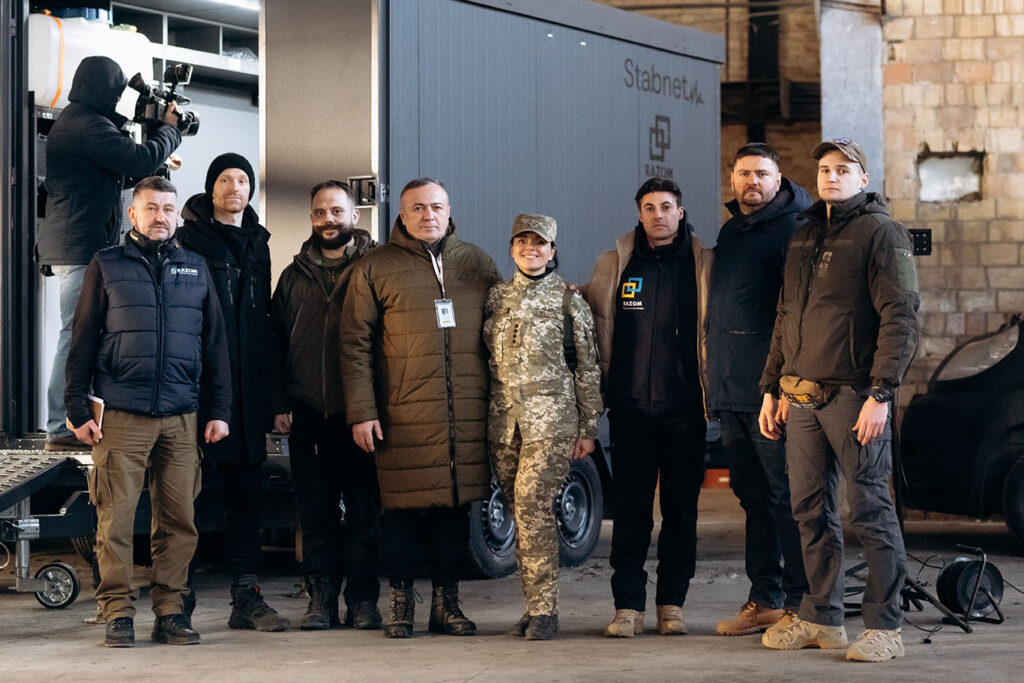
After testing in real combat conditions, the container will return for adjustments and further development. The goal is to create a network of 100 Stabnet units across the front line, effectively addressing the issue of losing wounded heroes during evacuation.
We invite you to learn more and support Razom’s Heroes Program!
Razom Contributes $100,000 in Aid to Sumy Hospitals
Recently, the Razom team in Ukraine undertook a working visit to the Sumy region, where donors provided much-needed aid to Sumy hospitals. During the visit, they engaged with medical staff, delivered assistance and participated in a roundtable discussion titled “Healthcare Facilities in the Sumy Region During War and Engagement of Charitable Aid.”
Since the onset of the full-scale invasion, Razom has been working with healthcare institutions in Sumy and the surrounding area.
During this most recent visit, Razom’s team delivered aid to several medical institutions in Sumy, including the Sumy City Hospital of St. Panteleimon, Sumy Central City Clinical Hospital, Sumy Regional Perinatal Center, Sumy Regional Children’s Clinical Hospital, and Sumy Regional Cardiology Center. This assistance, totaling over $100,000, included equipment such as a modern anesthesia machine, incubator for newborns, ventilators, ultrasound machine, hemodialysis machine, oxygen monitor, and more.
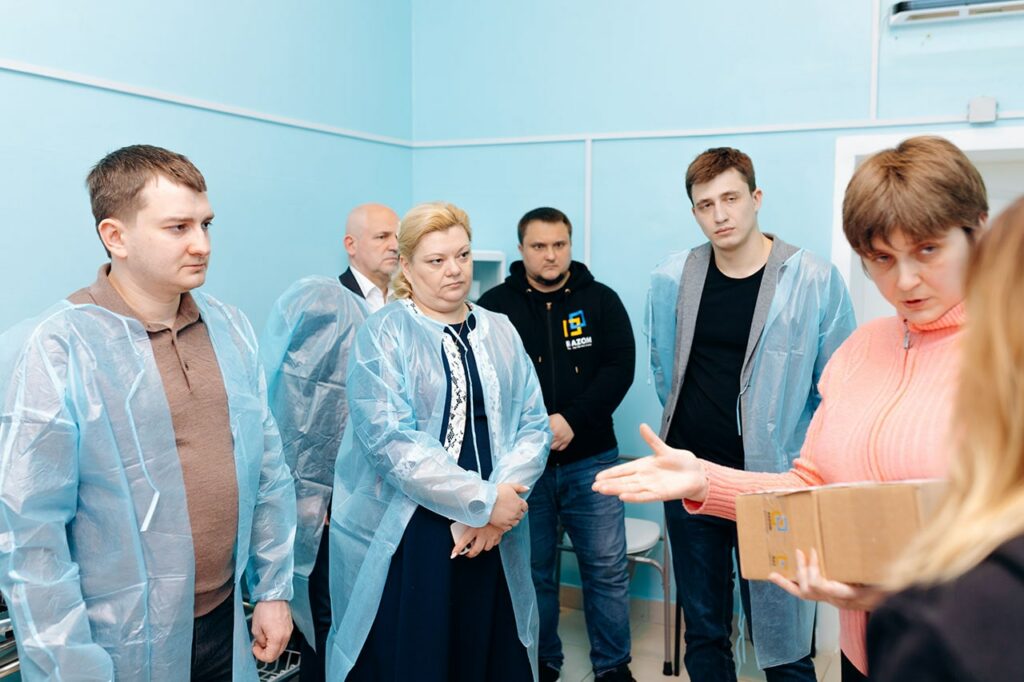
Olena Teriayeva, a medical expert with Razom Health, emphasized the importance of this aid in allowing medical institutions to reallocate funds to other areas. By communicating directly with medical directors and verifying their needs, Razom ensures precise delivery of assistance tailored to each institution’s requirements.
During the roundtable discussion, Razom representatives, alongside regional authorities, members of the Ukrainian Parliament, and medical institution representatives, deliberated about healthcare reform, material and technical support for hospitals, and the challenges of operating in a wartime environment.
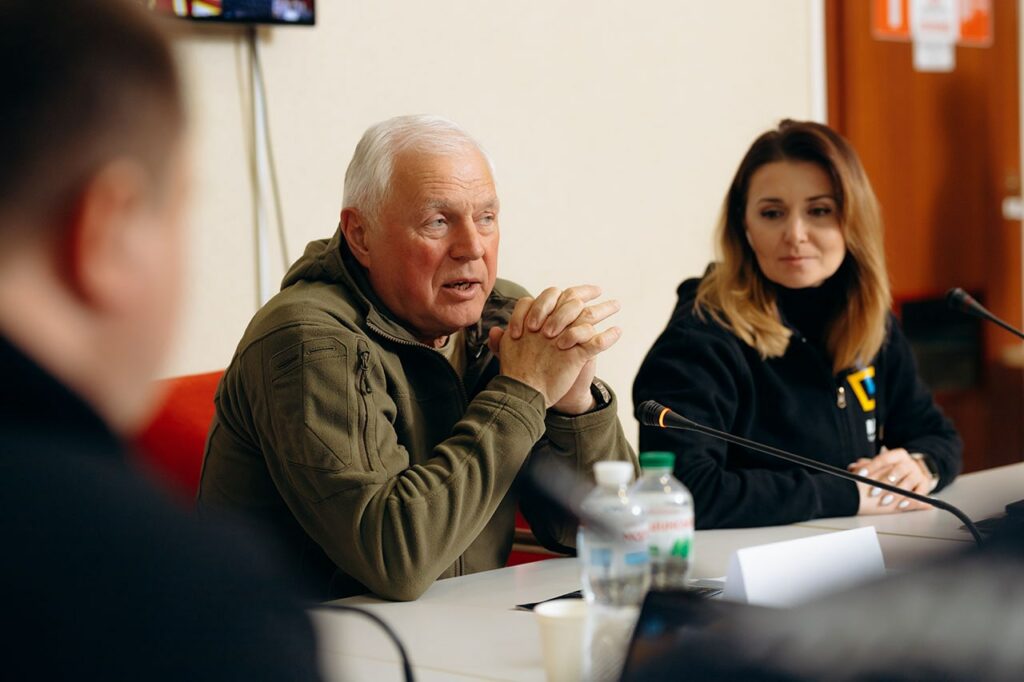
Evelina Kurilets, Executive Director of Razom in Ukraine, highlighted the significance of supporting medical facilities in the Sumy region, given its proximity to the border with Russia and the enduring impact of the invasion on local communities. Through effective collaboration with local authorities, self-government bodies, and hospital teams, Razom has helped facilitate positive outcomes for healthcare in the region.
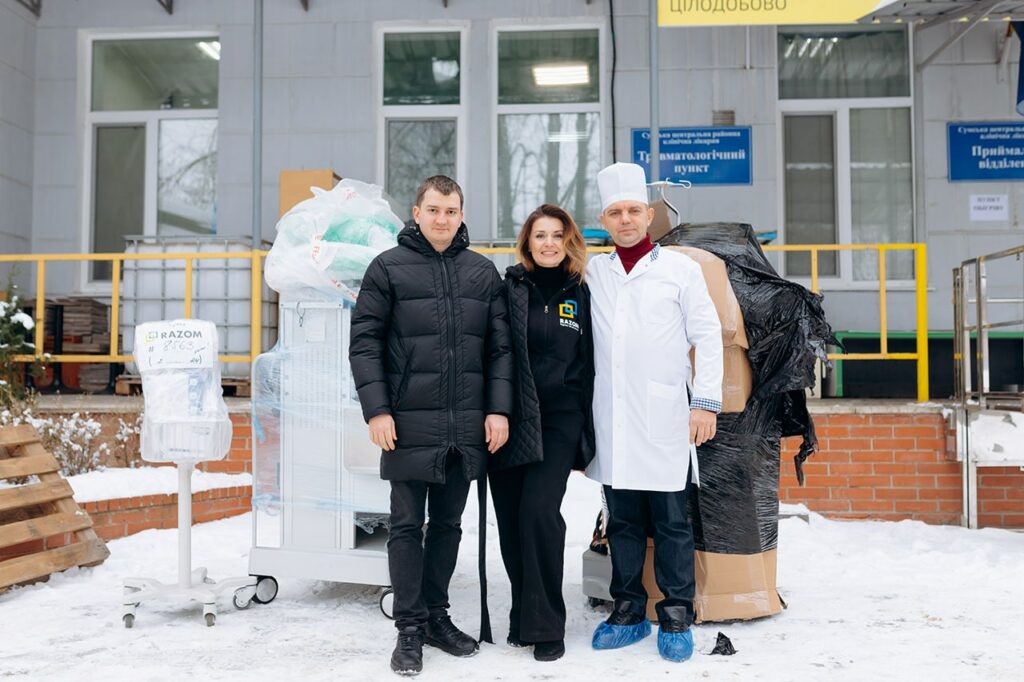
In 2023 alone, Razom for Ukraine delivered goods worth over $1.5 million, with an additional $600,000 allocated for medical equipment, medicines, and consumables for healthcare facilities in Sumy.
Razom for Ukraine has raised over $100,000,000 since the onset of the full-scale invasion, demonstrating unwavering support for Ukraine.
We invite you to learn more and support Razom’s Health Program!
Razom for Ukraine has issued a statement regarding reports that a Russian-American dual citizen has been arrested in Russia
Razom for Ukraine has issued a statement regarding reports that a Russian-American dual citizen has been arrested in Russia for reportedly making a donation to Razom in the immediate aftermath of Russia’s full-scale invasion of Ukraine.
Razom Brings to the U.S. Award-Winning Documentary About the Abduction of Ukrainian Children
Razom, along with the Kyiv Independent, will organize panel discussions and screenings of their documentary Uprooted in five American cities.
Uprooted is a documentary about the abduction, deportation and forcible transfer of Ukrainian children by the Russian Federation. The film investigates 30 cases of abduction of Ukrainian children in the occupied city of Mariupol and features interviews with three victims of the crime. It sheds light on the war crimes committed against Ukrainian children and unpacks the complexity of the systemic Russian policy of forcible deportations.
The War Crimes Investigations Unit of the Kyiv Independent won the National Competition of Journalistic Investigations award for this documentary.
U.S.-based nonprofit Razom for Ukraine will host the creators of the documentary as well as one of its subjects, while in America. The delegation will be represented by:
- Daryna Shevhecnko, CEO of the Kyiv Independent
- Yevheniia Motorevska, Head of War Crimes Investigations Unit, the Kyiv Independent
- Olesia Bida, War Crime reporter, the Kyiv Independent
- Ivan Matkovskyi, a subject of the documentary, a witness, previously forcibly transferred a minor who has been successfully returned to Ukraine.
“The Russians like to claim that they are actually saving Ukrainian children rather than deporting them. This is not true. They have established and finely tuned the system of deporting children to Russia. Maria Lvova-Belova is not the only one behind this; doctors, social service workers, and even ‘ordinary Russians’ who take Ukrainian children into their families are participating in this war crime,” said the film’s author, journalist Olesia Bida.
- February 14, 16 – New York City.
Location and tickets: HERE
Side event at Columbia University: HERE - February 15 – Washington DC
Location and tickets: HERE
Side event at Georgetown University: HERE - February 18 – Houston, TX
Location and tickets: HERE
February 19-20 – Austin, TX
Location and tickets: HERE
February 22-23 – Phoenix, AZ
Location and tickets: HERE
The screenings will be followed by panel discussions featuring:
- Daryna Shevchenko, CEO, Kyiv Independent
- Olesia Bida, War Crime reporter, Kyiv Independent, author of the movie
- Yevheniia Motorevska, Head of War Crimes Investigations Unit, Kyiv Independent
- Ivan Matkovskyi, a subject of the documentary and former forcibly transferred minor.
“The goals of the project are to bring the voices of people in Ukraine directly to audiences in the US, to raise awareness about the widespread russian war crime of abduction and deportation of Ukrainians, especially children, and to expose the evidence of russian genocide of Ukrainians as the United States debates whether to continue to support Ukraine’s fight for freedom,” said the manager of the project Katya Pavlevych.
About Razom
Razom, which means “together” in Ukrainian, is a leading U.S.-based nonprofit dedicated to upholding the principles of the Revolution of Dignity (Maidan) and actively contributing to the establishment of a secure, prosperous, and democratic Ukraine. Razom delivers on this mission along with a network of volunteers and partners, by providing humanitarian assistance, and administering programs and services to support health, advocacy, civil society and culture.
About Kyiv Independent
The Kyiv Independent is Ukraine’s fastest-growing English-language media outlet. It was created in November 2021, just three months before the full-scale Russian invasion of Ukraine, with a mission to serve as the bridge between Ukraine and the world, delivering reliable news, context, and on-the-ground reporting.
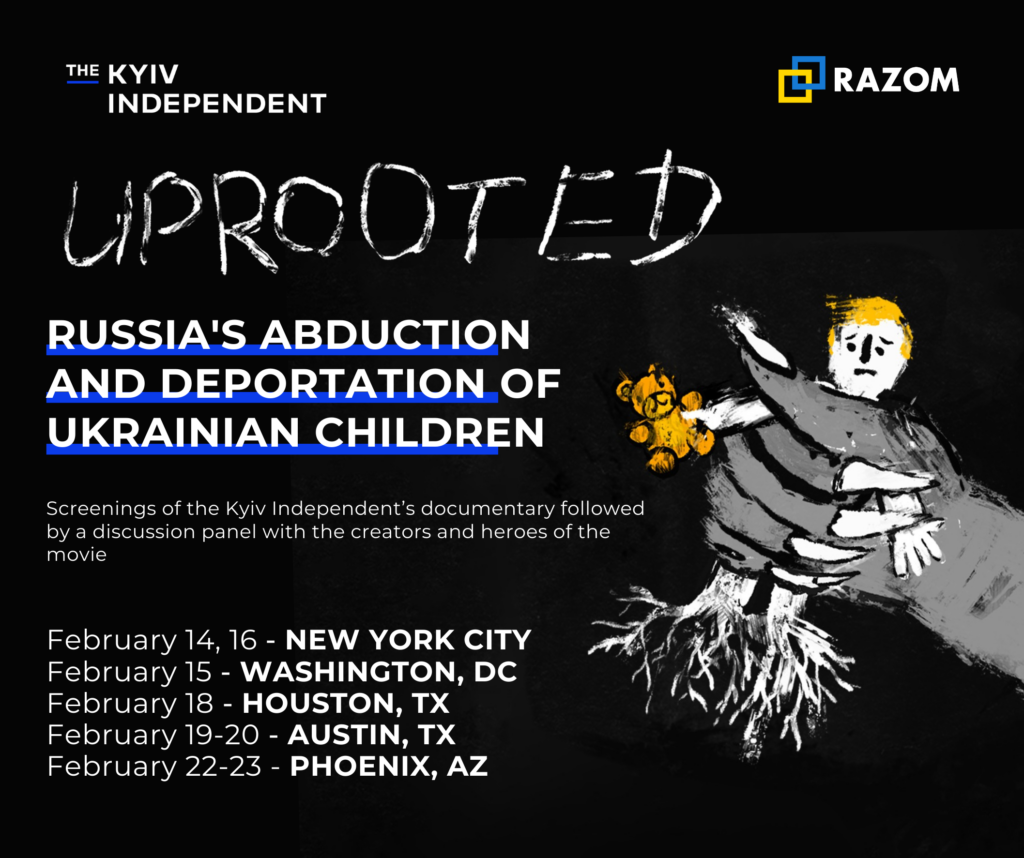
Together, we can demand accountability for stolen childhoods!
- « Previous Page
- 1
- ...
- 12
- 13
- 14
- 15
- 16
- ...
- 47
- Next Page »
